Financial analysis of « Wikileaks » from 2003 to 2019
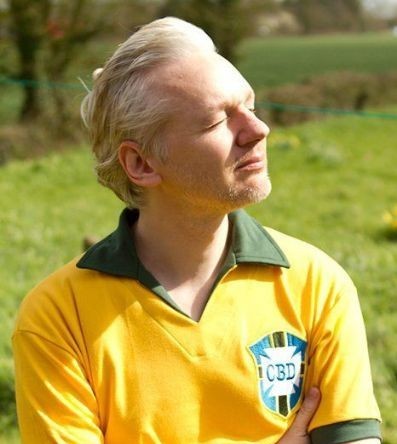
This document was written in January 2020. It could not be published right away because of the violent events that started on January 31, 2020: my computer was stolen in Paris for a mafia interested in its contents. From February 24th to 27th I attended the big « trial » of Julian Assange in the public gallery of room 2 of the Woolwich Court. I was sick after these four intense days which revealed many details about the environment of « Wikileaks » and Assange himself.
In March began the planetary madness of the « war against the virus » and the pseudo-sanitary dictatorship that now continues in Europe and the Western world. Today I have seen the presence of the German state in the « trial » that the City of London is organizing to eliminate Julian Assange. But Germany has been part of the « Wikileaks project » from the beginning.
This analysis focuses on the activity reports, financial statements and minutes of board meetings of the Wau Holland Stiftung, a German foundation. It demonstrates the key role of Germany in the « Project 04 Wikileaks ».
The Wau Holland Foundation and Sunshine Press Production, two structures managing the Wikileaks project
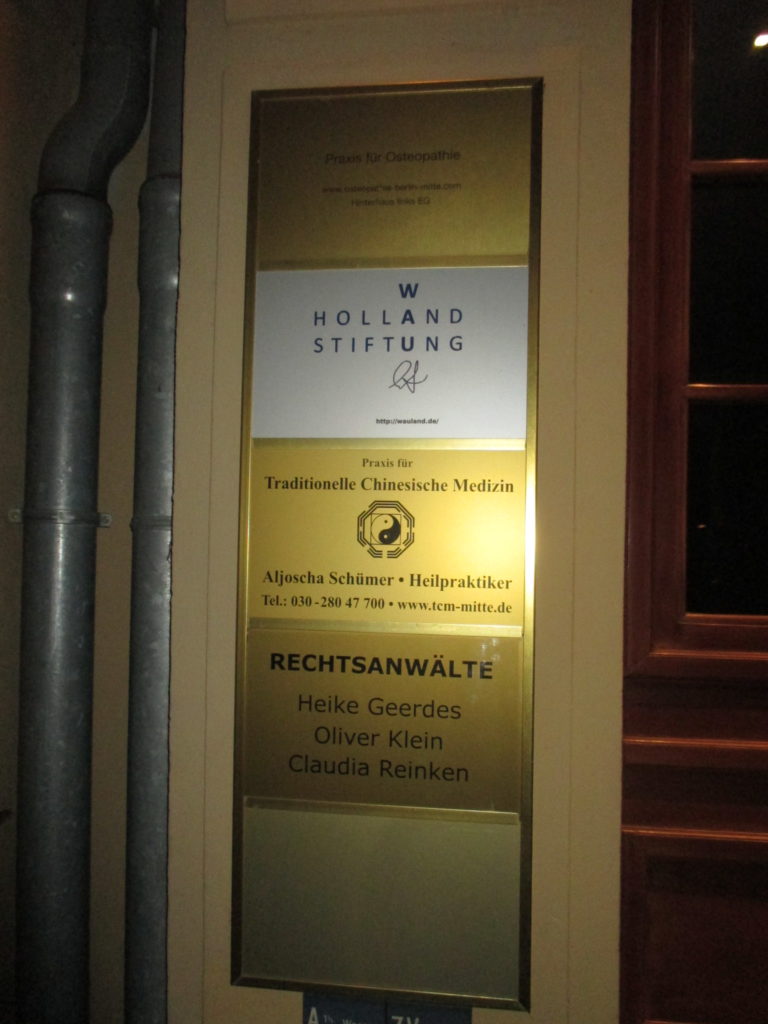
On October 25, 2010 a strong and moving meeting took place at the Frontline Club in London: Julian Assange held a conference with Daniel Ellsberg, the famous whistleblower who revealed the crimes of the US Army in the Vietnam in 1971. It is about American crimes in Vietnam and Iraq, the submission of the Western media to war propaganda, the role of citizens who must use the information revealed to stop these wars. In the end, Daniel Ellsberg expressed concern about the dangers threatening Julian Assange. He then asked how to help him build Wikileaks and offered to make donations. Julian Assange, who within two weeks will be prosecuted by the European arrest warrant issued by Sweden, then mentioned for the first time the legal structures of Wikileaks: the Wau Holland Foundation, a structure under German law, which according to him since July 2010 collects donations from the public that allow Wikileaks[1] to live, and an Icelandic company created just on October 8 that will support the first[2].
It is the Sunshine Press Production, a media company under Icelandic law whose majority shareholder, according to published tax documents, is Julian Assange, and whose shareholders are Kristinn Hrafnsson, Ingi Ragnar Ingasson and Gavin Hall MacFadyen minority shareholders. According to the RSK Register of Icelandic Companies, the « Certificate of Registration » shows that Sunshine Press Productions ehf ID-nr: 611010-0280 is domiciled at Ingi Ragnar Ingason at the address Klapparhlíð 30 270 Mosfellsbæra in Iceland[3]. It is a company that produces films, videos and television programs. It was established on October 8, 2010. The two non-Icelandic shareholders, Julian Paul Assange, Australian, and Gavin Macfadyen, British, obtain on October 20, 2010 from the Icelandic Social Security Office (Bjödskra), the « Kennitala », the Icelandic personal number allowing the opening of a company in this country and giving the right to a definitive social security after 6 months of living and working in this country[4]. It is however not necessary to provide a physical address in Iceland, a referenced mailbox is sufficient and it is a number of mailbox located in the State of Victoria which appears in the documents as the residence of Julian Assange while the address given for Gavin Hall MacFadyen is 34a Moreton Street in Pimlico, London.
Julian Assange’s name in the document is listed as Chairman, but Ingi Ragnar Ingasson and Kristinn Hrafnsson are both « Director » and Gavin Hall MacFadyen is « Deputy Director ». The Certificate Registration also mentions that a majority of the Board of Directors is required for the « signature », the decision making. Julian Assange, in spite of the 94% of the capital shares he owns, does not have the power of decision, he is in fact more of a spokesman than a true leader, whereas the power is legally jointly held by the 4 persons mentioned. Moreover, the organisations explaining Icelandic business law to foreign investors warn that in Icelandic law the Icelandic director, even if he is a minority shareholder, has the right to manage the company, to make expenses and to take responsibility in the absence of the majority shareholder domiciled abroad. The Icelandic state protects its citizens and companies and does not allow a foreigner to have decisive power in a structure under Icelandic law.
Sunshine Press Production has been operating until today and therefore files with the Icelandic tax office, the Ríkisskattstjóri Reykjavík, 10 balance financial statements from 2010 to 2019 that we have consulted with this institution. The annual financial statements from 2010 to 2018 are available. The company has activity, income and expenses, with asset figures ranging from the equivalent of 250,000 Euros in 2011 to almost nothing in 2017 before a recovery in 2018. In 2010 Sunshine Press Production owns the equivalent of 131,000 Euros of assets and at the end of fiscal year 2018, the annual meeting of the Board of Directors on August 29, 2019 mentions a profit of the equivalent of 13,000 Euros.
These facts raise several questions. How would Julian Assange have had the freedom to run his business when he is under house arrest in 2011 and 6 months of 2012 and then for 8 years locked up in captivity in the Equator apartment at 3 Hans Crescent Street in London? If the question is asked for the years from January 2011 to April 11, 2019, starting from this date, the answer is clear: Julian Assange being in prison, he cannot exercise his role in his company and therefore a receiver, an administrator of property should have been appointed for the interests of Julian Assange to be ensured. Normally, in European countries, such an independent administrator also ensures that the relationship between the impeded shareholder and his associates remains in accordance with the Law and with the agreement they made in opening the company, i.e. ensuring that Julian Assange is not harmed by his associates.
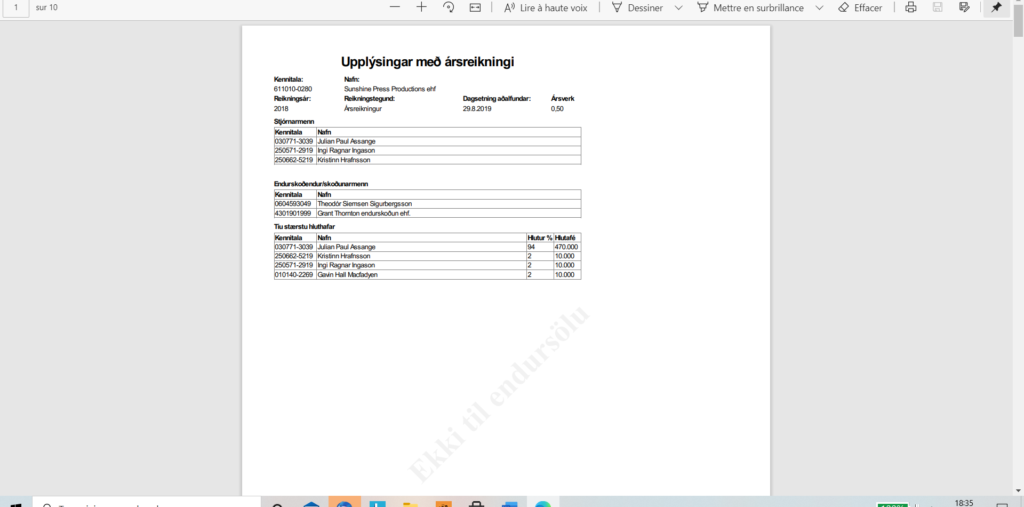
The document « Upplýsingar með ársreikningi » – « Report of the Board of Directors » – of August 29, 2019[5] shows that no such arrangements have been made. Worse, the Board of Directors is meeting as if nothing had happened, while the chairman of the Board and majority shareholder is imprisoned. « The Board of Directors of Sunshine Press Productions hereby confirms the financial statements of the Company for 2018 » with its signature[6]. The Board of Directors approves the accounts, 13,000 Euros in profits, 11,000 Euros in own accounts and decides to allocate the profit to next year’s fiscal year. The Board of Directors mentions the payment of 22,000 euros in salaries. Julian Assange was logically unable to participate in this Board of Directors while in prison. So what is the legal validity of these decisions? Who received the salary money? Did Julian Assange have access to this income? Who makes the day-to-day decisions affecting the operation of this company?
An investigation into these malfunctions is necessary, especially since Sunshine Press Production has been the company that the German Wau-Holland Foundation has contracted out the « 04 Informationsfreiheit – Wikileaks » project since 2014. (Project 04 « Freedom of Information »)[7].
Moreover, Gavin Hall MacFadyen passed away on October 22, 2016, although he is mentioned in this most recent document as still being an active shareholder and attending the Board of Directors meeting. His estate should be described in the documents with the name of the person who inherited his shares. A regulation regarding power in the company should have been adopted as of that date. How has Julian Assange been able to look after the interests of his Icelandic company when from October 2016 to May 2017 he is cut off from the world, locked up at 3 rue Hans Crescent and no longer has access to the internet?
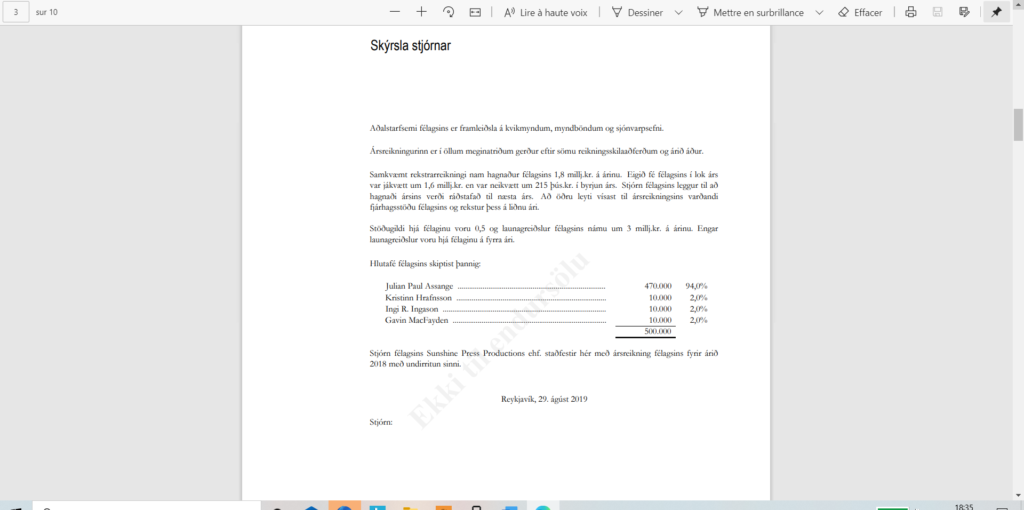
Today the income of this company is his only income and it is vital for his rights to be respected that access to this income is regulated by law.
However, Sunshine Press Production, where Kristinn Krafnsonn is actively working, is not the only supporting structure of the Wikileaks project. The most important structure is the German foundation Wau Holland.
[1] https://www.youtube.com/watch?v=FFDdHMEpqe, 1h.28 to 1h.30 minute. Julian Assange said he funded the Wikilkeaks project with his own money until July 2010.
[2] https://fr.scribd.com/document/341479410/Sunshine-Press-Productions-Ehf-private-limited-company-aka-Wikileaks;
https://www.rsk.is/fyrirtaekjaskra/leit/kennitala/6110100280
[3] https://www.rsk.is/fyrirtaekjaskra/leit/kennitala/6110100280, Certificate of Registration
[4] https://fr.scribd.com/document/341479410/Sunshine-Press-Productions-Ehf-private-limited-company-aka-Wikileaks
[5] https://www.rsk.is/fyrirtaekjaskra/leit/kennitala/6110100280
The documents can be obtained by writing to the Icelandic tax office RSK . We can provide them as proof upon request to us.
[6] Document page 2 « Upplýsingar með ársreikningi » 2019
[7] http://www.wauland.de/media/2014_Jahresbericht.pdf, Annual report 2014, page 1
2003 – 2011 from the beginnings of a small foundation to world celebrity
The Wau Holland Stiftung is mentioned only once publicly on October 25, 2010 and does not appear again in the media narrative around Wikileaks. No journalist has sought to understand what its role in the creation of Wikileaks is. Today, as Julian Assange’s life hangs by a thread and the « process » of his « extradition » to the United States comes to an end in premises belonging to the « Mayor and commonalty and citizens of the City of London »[1], the history of Wikileaks needs to be scrutinized in order to identify those responsible for his situation and thus save Julian Assange from a death foretold, an execution in one of the jails of the Old Bailey or a possible confinement in a psychiatric institution in a faraway country.
I Analyze here the legal documents available on the foundation’s website https://www.wauland.de/de/documents : annual activity reports, reports of the Board of Directors and public financial reports.
The Wau Holland Stiftung (Wau Holland Foundation) is a small foundation created on August 23, 2003 by relatives of computer scientist and hacker Herwart Holland-Moritz, known as Wau Holland, to perpetuate his memory[2]. Wau Holland died in 2001 at the age of 49. He is considered the pioneer of the Internet and was the creator of the Chaos Computer Congress, a worldwide gathering of hackers in West Berlin in 1981. The hackers’ gathering became the Chaos Computer Club in 10 years. The Chaos Computer Club is not an NGO, contrary to what its Facebook page suggests[3], but a nebula of private companies and associations created in 18 cities in Germany, as shown by the Handelsregister, the register of German companies[4]. It is a vast milieu of professionals and activists of new information technologies attracting teenagers and young adults for training and meetings around computers but also for alternative cultural and artistic events[5].
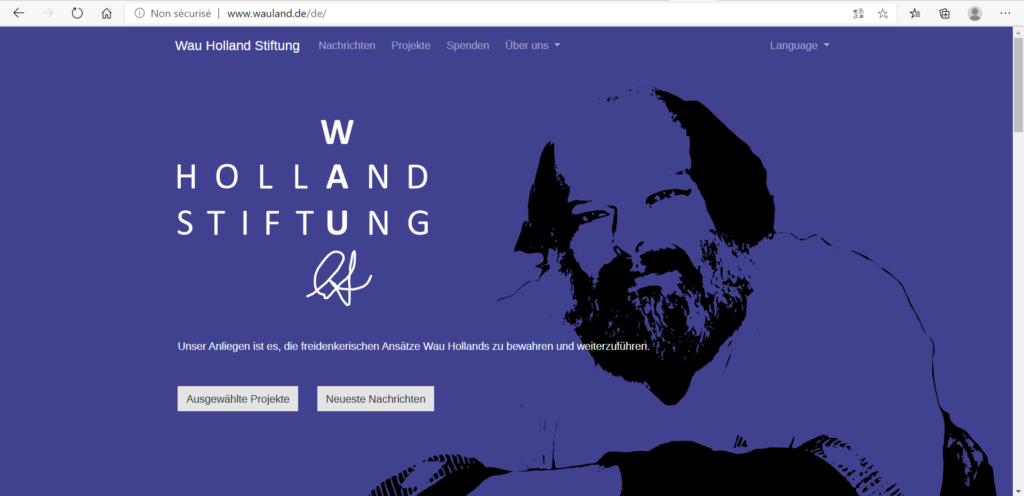
Herwat Holland-Moritz is seen by his relatives as a left-wing man. An article from 2003 presents him as having fought child prostitution and the 2003 activity report[6] of the foundation speaks of a computer project aimed at training for young victims of the war in Kosovo [7]. However, in spite of his aura as a hacker, Wau Holland reputation in German society is not controversial as hackers might be. At the foundation’s launch ceremony in December 2003 at the Chaos Computer Club, Socialist deputy Jorg Tauss, a media and information specialist, praised the deceased[8] . However, despite this media departure, the foundation’s assets are modest: 48,000 Euros invested in investments according to the first report of the Board of Directors in August 2003 [9]. The headquarters are in the village of Guxhagen near Kassel and the foundation’s directors are close relatives of Wau Holland’s family: Ursula Reichhardt, Gerriet Hellwig, Bernd Fix, Winfried Motzkus, Mel Wahl. In December 2003, the foundation was immediately granted charitable status.
Today the Wikipedia file on Wau Holland links films with and about him[10] . However, in spite of my politicised youth in the 80s and the important role that computers played in teaching at my Gymnasium in Köln, I must confess that I never heard of Wau Holland or the Chaos Computer Congress before I discovered their role in Julian Assange’s life. My generation entered adulthood with the use of the Internet and appreciated this freedom. For us, the hacker was certainly the one who, in these times of social regression in the 1990s, opened new horizons of the possible, but this milieu was too marginal for young people who were politicized to understand the importance of its political role as the world fell into chaos with the destruction of the Soviet Union, the end of the two blocs and the beginning of neoliberal globalization. Already in the 1980s, hackers were closely intertwined with the work of the secret services, as the history of the Chaos Computer Club shows.
[1] HM Landregistry N° du titre EGL535175
[2] Stitftungsurkunde vom 19 Dezember 2003,
https://www.wauland.de/media/2003-12-19_Stiftungs-Urkunde.pdf
[3] https://www.facebook.com/pages/category/Nonprofit-Organization/Chaos-Computer-Club-112304185449417/
[4] https://www.handelsregister.de/rp_web/result.do?Page=7
[6] https://www.wauland.de/media/2003-10-12_Zitty-Ausgabe21.pdf
[7] „Stiftet Daten“ Die (weltweit) erste Stiftung, die zum Datenspenden aufruft, stellt sich vor », https://www.wauland.de/media/2003-09-08_Stiftungstag.pdf
[8] https://www.wauland.de/media/2003-12-08_Kongress.pdf
[9] https://www.wauland.de/media/2003-08-23_Stiftungs-Antrag.pdf, Stiftungsgeschäft, 23 aout 2003
[10] https://en.wikipedia.org/wiki/Wau_Holland
2004 to 2006 – Transfer of powers and transformation of the foundation into a political tool
In its statutes published in 2004, the Wau Holland Foundation specifies its objectives: education, open source systems, preservation of the memory of the history of computer science, support for research and creation of new media and consumer protection[1]. The latter category includes political action against government security laws that limit Internet freedom. The 5 Board members elected for 2 years are all volunteers. In the years 2004-2006 the resources of the foundation are still modest but certain dynamics are raising out. In 2004, under the presidency of Ursula Reichhardt, there are 51 540 Euros invested[2] and the 1335 Euros from the annual investments are used[3]. The foundation owns a piece of agricultural land worth 1,500 Euros rented 20.44 Euros per year to a cooperative.
In 2004 the foundation was structured as shown in the minutes of the Board of Directors meeting of November 1st, it launched the project to safeguard the Wau Holland archives and participated in the Chaos Communication Congress Assembly with 5 seminars[4]. In the reports of the Board of Directors, the expenses are the expenses of participation of the members of the foundation in the various political and scientific gatherings of their milieu (Congress, summer camping of the Chaos Computer Club, Easterhegg festival[5]). Office and telephone costs are reduced: 40 Euros per extension[6]. The website is created by students and all media appearances are treated as donations in kind to the foundation. One person makes monthly donations of 255 Euros. Activity reports are kept very strictly. A press release is published on August 11, 2004 in support of the draft law on freedom of information carried by the SPD and the Greens which should allow all citizens to have access to all documents of public administrations[7].
In the years 2004 to 2006 the activity reports are very detailed compared to the period from 2009 to 2016. The renewal of the composition of the Board of Directors began at the Board meeting of July 2, 2005. It was decided to get closer to the Chaos Computer Club and even to co-opt some of the directors of the CCC to the Board of Directors, especially since the Chaos Computer Club donated 10 000 Euros to the foundation which can be considered as a contribution to the capital giving a power of attorney[8]. Winfreid Motzkus became president of the foundation but Ursula Reinhardt remains active, looking out for new partnerships[9]. This is all the more necessary as one of the directors is ill and the last seat on the board of directors remains vacant. Motzkus and Fix return to the original goal of the foundation, the establishment of the « Hacker Archive » to preserve the history of hackers. At the end of 2005, 10,000 Euros were earmarked for the project, which has not yet started[10]. In an article from 2005, the Wau Holland Foundation appears as a left-wing foundation alongside the Rosa Luxemburg Foundation, which is linked to the new left-wing party die Linke, the « Stiftung für Meschenwürde und Arbeitswelt », which is active in the growing alterglobalist movement[11], and the various « women’s foundations » that structured the German feminist movement at the time.
In 2006, the minutes of three Board meetings held every four months and the activity report are available. In these documents, from January 2006, it is a question of enlarging the Board of Directors in order to renew it and the discussion begins on the opportunity to approach the foundations of large private companies to obtain funds: SAP, Siemens, Telekom, Vodafone, Arcor, Versatel, Freenet, etc[12] . The Board meeting of July 29, 2006 acts decision to find candidates for the direction of the foundation with focus on dynamic leaders of the Chaos Computer Club. The two organizations are getting closer: the CCCgmbh (a private company named Chaos Computer Club) [13]is committed to building the Hacker Archive Center by July 2007, while the Foundation will support a donation campaign for the CCC 2006 annual congress [14].
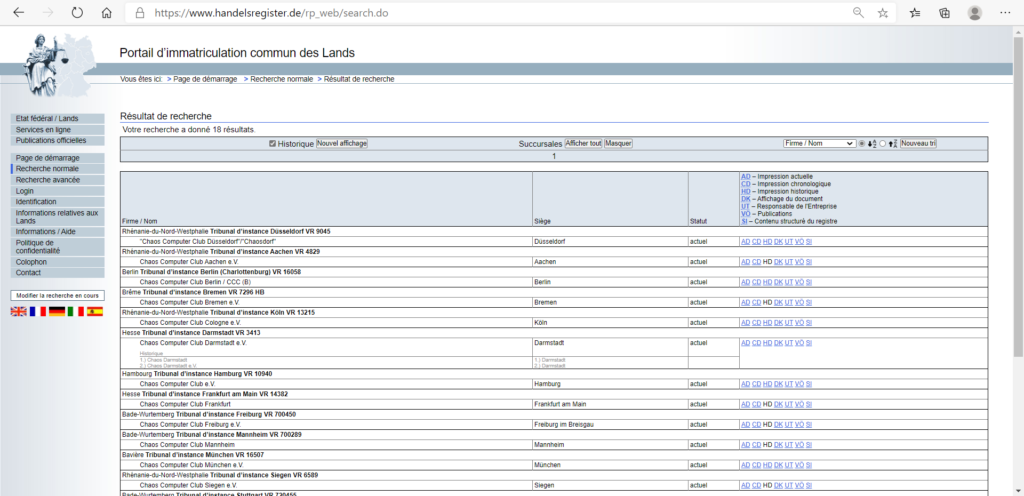
Andy Müller Maghun then appears for the first time in the documents of the foundation. He is mentioned there together with Tim Pritlove, professional manager of the Chaos Computer Congress. In 2006, Müller Maghun took over the responsibility for the management of the « Gross Spenden » (« large donations ») at the Wau Holland Foundation under the name of « Andy » at the suggestion of the Chaos Computer Club, of which he is a historical founder[15]. At the board meeting of 28 December 2006, held not in Guxhagen but in Berlin, two of the foundation’s leaders of the older generation were removed: one died and the other resigned. Two thirty year old fellows joined the Board of Directors: Jens Ohlig from Bonn and Hendrik Fulda from Hamburg. Together with « Andy » and Bernd Fix, they will initiate Wikileaks in 2008.
Jens Ohlig is an IT developer linked to the Wikimedia project[16] . Hendrik Fulda comes rather from a political background: he is a biologist and was a candidate in the parliamentary elections in 2005 on the Green list[17] with a socio-liberal program oriented towards the interests of small businesses and the improvement of daily life according to the liberal-ecological model.
Jens Ohlig and Hendrik Fulda [18]support the president of the foundation in media work, donation campaigns, cooperation with the CCC and the management of the website. The address of the Chaos Computer Club Gmbh at 11 Marienstrasse in Berlin will be used as the foundation’s mailing reference. Immediately a new breath of fresh air sets in and new projects emerge. Tim Pritlove, who managed to raise 30,000 Euros for the CCC Congress in December 2006, is charged with continuing the work for the foundation, while being paid by his organization, the private company CCC Veranstaltung Gmbh.
Tim Pritlove, artist, computer scientist and radio man is also an old founder of the Chaos Computer Congress, of which he is the main organizer as managing director of the CCC Veranstaltung Gmbh Congress organizing company. He is the manager, the media handler, the fundraisers handler that allow the hacker community to structure itself and carry political weight.
The Chaos Computer Club indeed plays a political role in Germany. Contanze Kurz, computer scientist and academic, current spokesperson for the Chaos Computer Club is also a politician who has her say in the Bundestag committees working on data protection, electronic voting, security laws. She has been an advisor to the German Constitutional Court on anti-terrorist laws issues and state surveillance of the Internet[19].
As early as 2005, the Board of Directors of the Wau Holland Stiftung had already proposed that the foundation directly manage the Chaos Computer Club Congress. The old leaders wish to study the partnership from a legal point of view, but the new and younger leaders present new projects without worrying about the forms. In 2006 the Hacker Foundation of California with its Tor project appeared as a useful partnership and investment for the foundation[20]. The foundation’s old goal « History of German Hackers » seems to be overtaken by new opportunities even though a budget is provided and a realization schedule is published.
Curiously, the arrival at the controls of the new generation coincides with the impoverishment of the documentation. The annual report at the end of 2006 no longer gives the exact amount of the foundation’s capital and the changes so important for the year are written in a few sentences[21] . The Wau Holland Foundation will therefore have some problems with the tax authorities, since the filing of annual reports is a legal obligation.
It seems that the new generation of managers, who are also experienced members of the « Hackers Szene », including Müller-Maguhn, Fix and Pritlove, have succeeded in a form of takeover bid on a small structure set up by the direct heirs of Herwart Holland Moritz. They will now be able to use it for large-scale projects that do not always coincide with the stated aims of the historical foundation.
[1] « Verfassung der Wau Holland Stiftung » – 1 Janvier 2004 ; https://www.wauland.de/media/2004_Stiftungs-Verfassung.pdf
[2] https://www.wauland.de/media/2004-01-11_Konstituierende-Sitzung.pdf 4
[3] https://www.wauland.de/media/2004_Jahresbericht.pdf;
Annual report 2004
[4] op.cit ttps://www.wauland.de/media/2004_Jahresbericht.pdf
[5] https://www.wauland.de/media/2004-12-27_Vorstandssitzung.pdf
[6] Op.cit.
[7] https://www.wauland.de/media/2004-08-11_Pressemitteilung.pdf
[8] https://www.wauland.de/media/2005-07-02_Vorstandssitzung.pdf
[9] Op. cit, « What’s the Hack » in Boxtel
[10] https://www.wauland.de/media/2005_Jahresbericht.pdf
[11] https://www.wauland.de/media/2005-12-03_FR.pdf
[12] https://www.wauland.de/media/2006-03-18_Vorstandssitzung.pdf
[13] https://www.handelsregister.de/rp_web/result.do?Page=7
[15] « Es wird beschlossen, dass die Akquise von Gross-Spenden durch Andy und Tim vorgenommen wird; dies wurde so vom CCC vorgeschlagen » https://www.wauland.de/media/2006-07-29_Vorstandssitzung.pdf
[16] https://conference.timemachine.eu/index.php/speaker/jens-ohlig/
https://diff.wikimedia.org/author/jens-ohlig/
[17] https://www.wen-waehlen.de/kandidaten/hendrik-fulda_1856.html
[18] https://www.wauland.de/media/2006-12-28_Vorstandssitzung.pdf
[19] https://de.wikipedia.org/wiki/Constanze_Kurz
https://fahrplan.events.ccc.de/congress/2019/Fahrplan/speakers/1630.html
[20] Eine Zusammenarbeit mit der Hacker Foundation aus Kalifornien wird möglichst noch während des Congresses ausgelotet. Das TorProjekt hat angefragt Spenden über die Stiftung abzuwickeln. ». Vorstandsitzung des 28.12.2006, op.cit
[21] https://www.wauland.de/media/2006_Jahresbericht.pdf
Years 2007 to 2009 – implementation of the 04 Wikileaks project in the Wau Holland Foundation
Andy Müller Maguhn and Bernd Fix of the Chaos Computer Club as project leaders and promoters of the project Wikileaks
It is a pity that for the years 2007 to 2009, which are crucial in the run-up to the Wikileaks project, the Wau Holland Foundation’s activity reports are sketchy and very brief. Nevertheless, the generational changes are formalised and the new leaders are given substantial powers. At the board meeting of 27 December 2007, now held annually instead of quarterly, Hendrik Fulda becomes vice-president behind Motzkus, and Jens Ohlig the press officer. After the departure of Ursula Reichhart, who had made it possible for them to join the foundation, they decided not to co-opt anyone on the board and to keep Bernd Fix as the fourth member, which favours, as in any organisation, a high concentration of power.
It was then that the name Wikileaks appeared for the first time in the « Others and perspectives » section[1]. The project is presented as an international initiative in the same way as the Hacker Foundation. Julian Assange first came to the Chaos Computer Congress in December 2007 with Daniel Domscheit Berg as Wikileaks. He may even have come to the CCC summer camp after his stay at the World Social Forum in Kenya in January 2007. The video cannot be found on the internet but this presence is mentioned in the videos of the CCC Congress in 2008 and 2009[2].
Bernd Fix and Andy Müller Maguhn appear to be the masterminds of the Chaos Computer Club, so it’s no wonder they end up taking over the Wau Holland Stiftung. They are not newcomers but old backpackers from the German « Hacker Szene ». Both have been friends and close friends of Herwart Holland Moritz. Bernd Fix’s aura is sulphurous as he is known as the creator of the first computer virus called after him Fix and used by NATO in 1988 to attack the computer systems of the declining Soviet Union. Fix defends himself against this, saying his idea was stolen after he left the university, but doubts remain about the known involvement of the German secret service in the hacker community in the late 1980s[3].
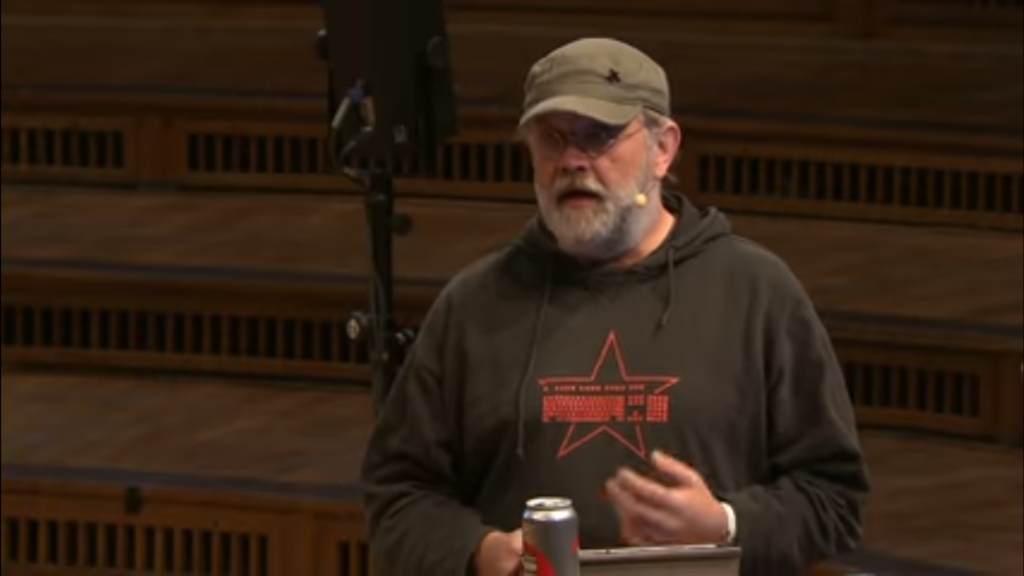
Bernd Fix is still in the Chaos Computer Club, he is also the director of the Wau Holland Foundation since its creation and close to the CIJ, the Center for Investigative Journalism and its sponsors such as the American David and Elaine Logan Foundation[4] . Bernd Fix’s videos show an analyst with a global vision and thinking on politics[5]. It is very difficult to find evidence of his relationship with Julian Assange, these links remain hidden, except for the press conference on 24 November 2011 at the Frontline Club where the leaders of the 04 Wikileaks project show up the one and only time with their employee[6]. In 2013, the Swiss women’s magazine « Annabelle » presented him as a member of the board of directors of the Wau Holland Stiftung, the organisation that pays « Assange’s salary« [7].
Andy Müller-Maguhn is known to have been a « friend » of Julian Assange, he was then spokesman for the Chaos Computer Club and an already historic leader. He was handling media communication and is a historic player in the creation of the internet. He is therefore very prolific on the internet while remaining quite secretive about his concrete personal and professional life. His official biography says he was born in 1971, so he would be the same age as Julian Assange but we don’t know his region or his background. His date of birth is just as questionable as Julian Assange’s birthday: when some sources mention him as the creator of the Chaos Computer Congress with his friend Herwart Holland Moritz in 1981, he would then be 10 years old. The relationship that an adult like Wau Holland would have with a 10-year-old child could easily be described as abusive: if his date of birth is 1971 and he joined the Chaos Computer Club in 1986, he would be 15 years old at the time, and as a minor it is surprising that the very conservative West German society has allowed an adult to embark a child on the illegal adventure of computer intrusion. Hackers, middle-class youngsters from broken homes, enter hacking between the ages of 11 and 16. It is not surprising that the Bundesnachrichtendienst is interested in the presence of teenager in these illegal activities: it would be interesting to check whether the Jugendamt, the youth welfare office, was also interested then and did its job.
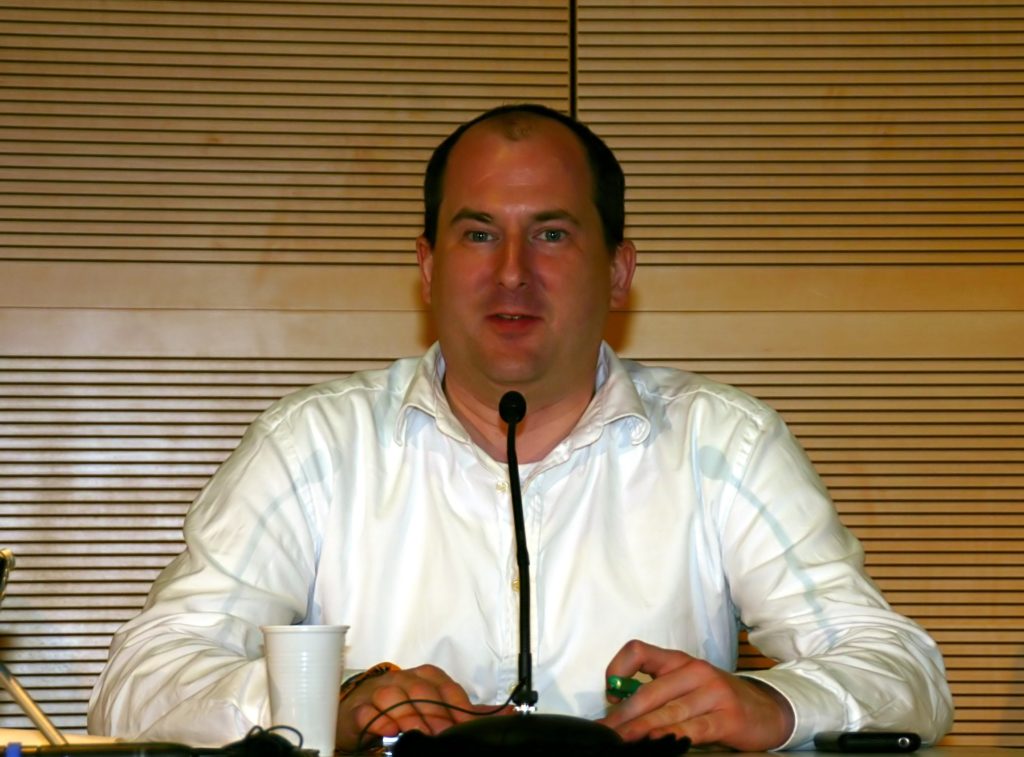
Andy Müller Maguhn is therefore known for his activity as a hacker in the Chaos Computer Club since the 1980s without any particular intrusion being attributed to him. In 1995 he founded an IT security company, DataReisen Bureau, which is still located at 11 Marienstrasse in Berlin next to the Chaos Computer Club offices. Although he does not appear to be a graduate of a German university, he was elected in 2000 at the age of 29 as a member of the ICANN, the Internet Corporation for Assigned Names and Numbers, a United States structure dependent on the US Department of Commerce, which allocates domain names for websites all over the world[8]. In 2003 he was a member of the Board of European Digital Rights, a European network of NGOs lobbying the EU authorities for internet freedom[9]. In 2006, as a spokesman for the Chaos Computer Club, he was co-opted to the Board of the Wau Holland Stiftung and officially became its president in 2016. Today he is still the « second » president of the the Foundation while administering the Center for Investigative Journalism, the journalism training facility created by Gavin MacFadyen, Julian Assange’s other mentor[10].
He is often questioned about the Chaos Computer Club scandals, in particular the violent deaths of two young hackers active in the hacking milieu and who are possibly alleged to be victims of murder: Karl Koch in 1989 and Boris Floricic in 1998. It is curious to learn that he took the German media to court in 2006, in particular the collaborative site Wikipedia, to ban them from publishing the full name of Boris Floricic on the pretext of safeguarding his memory. For an activist for transparency and internet freedom one would have expected a more tolerant attitude towards the freedom of journalists to investigate suspicious cases[11].
The Chaos Computer Club, a nebula of networks, clubs and private computer companies organising and promoting hacking, was created within German left-wing circles by Wau Holland in 1981, Bernd Fix and the then 15-year-old (?) Müller Maguhn. The participation of young single boys with no visible parents in these political operations of computer intrusion and the laxity of the youth protection system in dealing with this phenomenon is one of the points that have always surprised me in this case. It is as if society and the Western states (West Germany, the United States, Great Britain) found it normal that children aged between 11 and 16 years old should be recruited into these operations of political-police manipulation and shamelessly used by adult men without society being able to oppose them. The book by Julian Assange and Suelette Dreyfus, published in 1997 and 2001, tells fragments of the stories of these boys in Europe, the United States and Australia in the early 1990s in a romanticized form (Assange, Dreyfus « Underground, the Tales of Hacking, Madness and Obsession on the Electronic Frontier », Reed Books Australia 1997 and William Heinemann 2001 ).
The Bundesnachrichtendienst (BND), the West German secret service, has been interested from the start to control the milieu of hacking and settles the RAHAB project, which aims to use the skills of these influenceable young people to test the reliability of Western computer networks and also to attack enemy computer systems, those of the Soviet Union. Documents suggest that the members of the Chaos Computer Club have been of direct utility to the West German secret service, which would not be surprising – the beginnings of computer science coincide with the new phase of the Cold War, which ended with the defeat and disintegration of the Soviet Union in 1991. That the BND sought to exploit the skills present on German soil for the defence and expansion of Germany is fitting.
In 1985 the young hacker Karl Koch and 5 of his colleagues from the Hannover group who specialised in hacking VAX/VMS servers were approached by the KGB and immediately trapped by the BND. In the same year Bernd Fix demonstrated at the University of Heidelberg his « Fix » virus capable of attacking the large IBM370 mainframe systems used by the majority of the world’s computerised companies at the time (banks, insurance, railways, airlines and health systems). The Soviet Union acquired several IBM mainframe systems in 1987, allowing the BND and the NSA to directly penetrate its computer system via the « Fix » virus. In 1987, several managers of Western military and IT companies were arrested in Germany and accused of handing over VAX and IBM mainframe secrets to the Soviet Union.
The young hackers of Hannover, all linked to the CCC, were arrested in 1987[12]. Karl Koch is said to have accepted collaboration with the BND under pressure from the agents at the beginning of 1989. The recruitment of this 23-year-old young man into the war of the secret services was fatal to him: his body was found burnt on 1 June 1989. Karl Koch is said to have tried to integrate into society by working as a driver for a CDU deputy who tried to protect him (or who used him). The loneliness of a young man in the face of the overwhelming political system and the lack of support from his home environment are blatant. The media already exploited the hacker’s fragility in order to better sell his image associated with sensationalist hacking « storytelling »: two journalists from the North German Rundfunk offered Karl Koch a large sum of money in April 1989 in exchange for « a live hacking show »[13]. The ingredients are already in place in 1989 to sell a story similar to « Wikileaks » and allow the mainstream media to make money immediately just as they will make a lot of money with Julian Assange’s face and story for years and up to the present day.
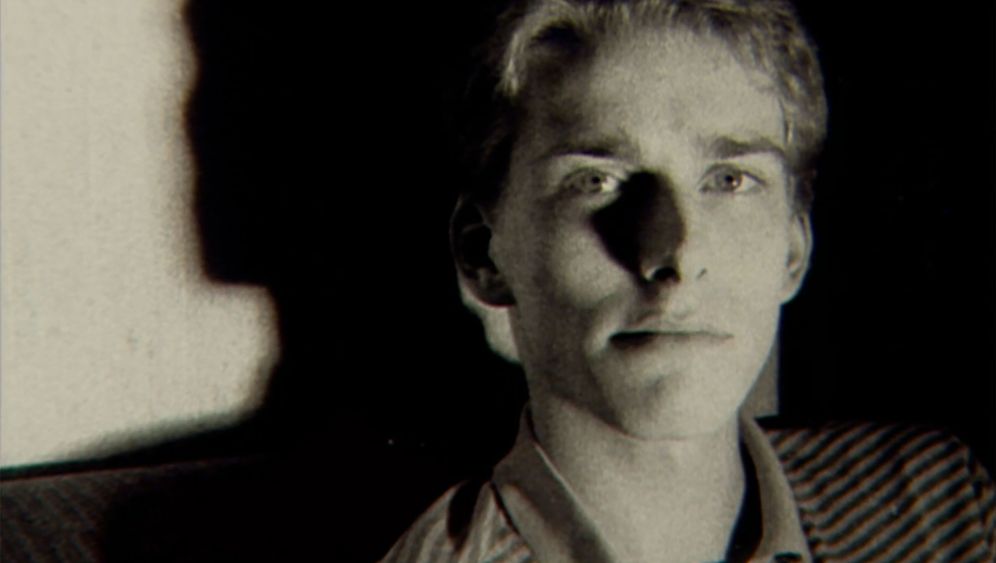
Since then Karl Koch has become a kind of morbid legend of the Chaos Computer Club without ever getting justice. Several of his friends demanded an investigation into the reasons for his death (he was an orphan), but the Chaos Computer Club did not support their demand. No serious investigation was carried out and Andy Müller-Maguhn, who must have known him in this small milieu, states in several CCC videos that psychiatric problems would have overcome the 23-year-old. Just like today, psychiatric problems would have pushed Julian Assange to commit suicide. Of course, it is not Andy Müller Maguhn who is saying this, but Stella Moris who is declaring it as a fatality on all the media, instead of calling for the release of his alleged companion, Julian Assange, in the name of the 2016 UN Ruling demanding his release, compensation and safety in a country of his choice.
However, Stella Moris, with her uncertain identity (she also calls herself Sara Gonzalez Devant or Sara Smith Robertson) makes the repeated announcement of Julian Assange’s suicide in prison to resonate cruelly with Karl Koch’s alleged suicide and the statements about his alleged insanity made by Andy Müller Maguhn at the time of the events.
Andy Müller Maguhn is in fact the first person liable to the publication Project « 04 Wikileaks », as we shall prove in this analysis. If Julian Assange is suicidal, why doesn’t he do everything in his power to prove the innocence of his employee Julian Assange by assuming his responsibilities as a boss in the face of justice? Why doesn’t Stella Moris urge him to do so? If she is Julian Assange’s girlfriend, she knows necessarily that he is no more than the project manager of the Project « 04 Wikileaks », the « Creative director » of the editing of the movie « Collateral murder » and that he therefore has no criminal responsibility. Decidedly, the story of the Chaos Computer Club looks like a bad thriller where crazy hackers, or driven to madness, always end up committing suicide. The Chaos Computer Club likes legends but not really transparency about the fate of its most politically exposed members.
Suspicious deaths are common in the history of both Wikileaks and the Chaos Computer Club. For Wikileaks we can list Seth Rich, Adrian Llamo, Michael Ratner, John Jones, Michael Hastings, Arjen Kamphuis… After Karl Koch it is Boris Floricic’s turn to be a victim of politics within the Chaos Computer Club. This German hacker of Croatian origin (as his name suggests) was involved in hacking Deutsche Telekom’s SIM cards. He was found hanged dead in 1998 at the age of 26 in Berlin, and despite his family’s request, the police did not investigate. Yet the hacker community knows how closely their hacking activity is intertwined with the politics and actions of the secret service. At the time Germany was involved in the war against Yugoslavia through its support for Tudjman’s new Croatian fascist regime. The Yugoslav company Iskra was a serious competitor of Deutsche Telekom and Siemens in Eastern Europe.
Moreover, it was Siemens that took over what was left of the pieces of Iskra after it was dismembered in 1992 by the Croatian regime, which was friendly to the newly reunified Germany and expanding in Europe. Is there a link between the war in Yugoslavia, the policies of Deutsche Telekom and Siemens in Croatia and the death of the young hacker? We don’t know, and that’s a great pity. It is not Andy Müller-Maguhn, the leader of the Chaos Computer Club and future boss of Julian Assange, who will enlighten us: summoned from time to time to explain himself publicly about the probable assassinations in his organisation, the man evacuates these questions by this fatalism « we can do nothing ». These sentences « That’s the way it is, that’s life » are so convenient to serve today to demobilize in the case of Assange’s execution[14]. It is true that the absence of a real judicial enquiry means that Andy Müller-Maghun never has to seriously explain himself. The negligence of the German State in the face of the suspicious death of young men in the prime of life leaves a doubt about the will of this State to shed light on the reality of the way its hackers operate.
[1] 7. » Verschiedenes und Perspektiven In Zukunft soll eine noch engere Zusammenarbeit mit dem CCC e.V aber auch mit internationalen Initiativen wie der Hacker Foundation oder Wikileaks erfolgen. », https://www.wauland.de/media/2007-12-27_Vorstandssitzung.pdf
[2] https://media.ccc.de/v/26c3-3567-en-wikileaks_release_10#t=1365
https://www.youtube.com/watch?v=-w6vtdGI5EI;
[3] https://hoi-polloi.org/~brf/rahab.html
[4] https://www.youtube.com/watch?v=GIG-TFmuke0
[5] https://www.youtube.com/watch?v=CP0Dd4N_bAE
[6] https://youtu.be/2YPaxLP3hFw
[7] https://hoi-polloi.org/~brf/media/2013-04-01_annabelle.pdf
[8] https://en.wikipedia.org/wiki/Andy_M%C3%BCller-Maguhn
[9] European Digital Rights (EDRI) https://edri.org/our-work/edrigramnumber13new-edri-members-2003/
[10] https://tcij.org/person/andy-mueller-maguhn/
[11] https://en.wikipedia.org/wiki/Tron_(hacker)
https://berlin.ccc.de/~andy/CCC/TRON/wikipedia/erklaerung.html
https://www.welt.de/wirtschaft/webwelt/article192456/Wie-ein-toter-Hacker-wikipedia-de-lahmlegt.html
[12] https://www.afcea.org/committees/cyber/documents/impactofbndprojectrahabandccconthefutureofcomputer-networkmediatedespionage-cuckooseggpreque.pdf
[13] http://networkclan.de/pdf/KarlKoch.PDF
[14] https://psychedelicdungeon.wordpress.com/2010/09/15/wikifreaks-pt-4-the-nerds-who-played-with fire/?fbclid=IwAR2OojVdb4JsBctnZ5eanwrmrJkUa8seF9nboaKbfLLZPlWldynpppRdEOA
Financial and legal opacity in the implementation of the Wikileaks project in 2007-2009
Henrik Fulda appears in the official documents of Wau Holland’s Board of Directors as an active manager: he takes care of contacts with authorities, banks, accounting and manages the media coverage together with Ohlig. Communication is becoming more and more important in the work of the foundation in order to bring in donations. The lack of financial reports for 2005 and 2006 has attracted the attention of the tax authorities and Fulda has to do the accountability of 3 years, find a tax consultant and negotiate with the tax authorities. In the documents from 2007 there are no figures given this year for 2007 which is unusual for a German organisation. Just the annual report of the Board mentions a few thousand Euros for the successful donation campaign against e-voting and participation in an international campaign for the Tor Project[1]. The activity report is no more talkative: while the figure of 63,000 Euros is given for the capital of the foundation, no figures are given for the donation campaigns.
When the Wau Holland Foundation decided to include Julian Assange’s action in its activities during 2008, the foundation’s reports are strangely brief, as if it were necessary to conceal something. For 2009, when the Wikileaks project is taking off, the minutes of the Board of Directors are no longer public. At the board meeting of 27 December 2008 Hendrik Fulda became treasurer and therefore has full authority over the bank accounts where the donations arrive[2]. One sentence sums up the new policy of the directors: apart from the campaigns to collect donations for the Tor search engine and against electronic voting, it was decided to make it become a convergence tool for the various projects in the Chaos Computer Club milieu and to advertise them directly as soon as these projects are in line with the statutory objectives of the foundation[3]. This will be the case for Wikileaks even if the report sends Wikileaks in half a sentence under the heading of « Others and perspectives, cooperation with international initiatives such as Hackers Foundations USA or Wikileaks »[4]. Julian Assange is not even mentioned as the major promotor of « Wikileaks », even though a few days earlier he had just made a very well-attended and applauded speech at the Chaos Computer Congress on the political possibilities opened up by the freedom to publish leaked documents on the internet[5]. The leaders of Wau Holland find it very difficult to communicate about the money received from citizens: in the 2008 activity report, instead of the sum next to the word « donations received » there is not a figure, but « XXX » [6].
[1] https://www.wauland.de/media/2007-12-28_Vorstandssitzung.pdf
[2] « 1. Neu-Verteilung der Vorstands-Aufgaben Mit Wirkung zum 1.7.2008 übernimmt der stellvertretende Vorsitzende H.Fulda die Aufgabe des Schatzmeisters von B.Fix. Der neue Schatzmeister erhält dazu alle Unterlagen sowie die Berechtigungen für die Stiftungskonten (Banken, PayPal). », Vorstandssitzung Protokoll vom 27.12.2008,
https://www.wauland.de/media/2008-12-27_Protokoll.pdf
[3] « Es wird beschlossen, neben den Aktionen „Tor-Netzwerk“ und „Wahlcomputer“ weitere Spendenaktionen aus dem CCC-Umfeld zu fördern und als Anlaufstelle für Sammelprojekte zu fungieren. Dafür wird die Stiftung durch direkte Kommunikation in Projekten werben, die sich in Übereinstimmung mit der Stiftungssatzung engagieren », op. cit.
[4] Verschiedenes und Perspektiven In Fortführung der bisherigen Ansätze soll auch in Zukunft eine noch engere Zusammenarbeit mit dem CCC e.V, aber auch mit internationalen Initiativen wie der Hacker Foundation (USA) oder Wikileaks erfolgen. » op.cit.
[5] https://media.ccc.de/v/26c3-3567-en-wikileaks_release_10#t=492
[6] « Im laufenden Jahr 2008 hat die WHS Spenden in Höhe von € xxxx erhalten, davon xx % für ausgeschriebene Spendenprojekte. » ; Page 1, https://www.wauland.de/media/2008_Jahresbericht.pdf
Does the Wau Holland Stiftung run « Wikileaks » and is it responsible for it?
At the CCC summer camp in summer 2009 Julian Assange and Daniel Domscheit Berg, who is a member of the Berlin Chaos Computer Club, present Wikileaks as a political project, idea and data security technology[1]. In October 2009 Julian Assange presents Wikileaks at a conference in Malaysia [2] and in December 2009 he returns to Europe to work with Daniel Domscheit Berg. The Board report of 28 December 2009 is only half a page long but mentions this important decision in the section « present and future donation campaign »: « « In August 2009 it was decided to support the Wikileaks project by setting up a donation portal and especially by enabling easy donation from abroad via internet payment services. »[3]
« Fördern » is in the German language much more precise than « promote ». It is a question of subsidising by actively taking care of it and ensuring its realisation. In the culture of NGOs it is the English word « to implement » which best captures the complex relationships of responsibility and power that are often established between « unequal partners ». German public and private foundations have a strong, structured political history and practice that goes back more than 60 years. Political foundations, which set the example, are financial powers in the hands of parties and the state, as researcher Dorota Dakowska has analysed[4]. According to the principle of subsidiarity, it is not uncommon for private foundations, associations or churches to subcontract the implementation of state policy on an international level[5]. When a German foundation decides to « fördern » it is not to serve as a simple post office box to collect money, contrary to what Julian Assange said and perhaps thought in 2010.
The official reports of the Wau Holland Stiftung do not mention who was the decision-maker in the implementation of the Wikileaks project, nor how the decision was taken to collaborate with Julian Assange and Daniel Domscheit Berg, nor what legal and practical form this collaboration took. The reports are singularly unclear, which contrasts with good practice in Germany in the NGO sector and the political foundation sector. Knowing that each action of a political foundation must give rise to a report mentioning the names and qualities of the participants, it is very surprising and very detrimental to the public interest that in a project as important as « Wikileaks », which will stir up more than 1 million euros per year in 2011 and occupy media space for 10 years, it is not possible to know who decided to launch it, which german Wau Holland manager is liable to it and what freedom Julian Assange had or did not have in his work with the Foundation. Today, Julian Assange is the ONLY person being prosecuted for the « 04 Wikileaks project », which was a project carried out by a structure under German law, under the responsibility of the leaders of this structure, German citizens. Why should Julian Assange have to pay instead of them? Moreover, the European citizens who gave their money for « Wikileaks » are entitled to know who spent their money and for what. The German state should also take a closer look at the too vague annual reports of the Wau Holland Foundation.
We also do not know what role Daniel Domscheit Berg played in the setting up of the Wikileaks project within Wau Holland, as he was very prolific in the media after his argument with him in the summer of 2010 about the character of Assange, but less so about his relationship with the Wau Holland Foundation. We have just learned from a online chat that Domscheit Berg’s relations with Andy Müller Maguhn are so bad that Maguhn is accused of having chased him out of the Chaos Computer Club[6]. The power relations between the protagonists of this story are nevertheless important for Julian Assange’s life, which will be turned upside down in the summer of 2010 with the legal proceedings against him. The power relationships between Müller-Maguhn, Fix, Fulda, Ohlig from one side, Assange and Domscheit-Berg from the other side, in 2008 and 2009 have indeed determined the project contract that Julian Assange will sign with the Wau Holland Foundation on 21 December 2010 as « Project Manager » (« Projekt Leiter ») on the foundation’s 04 « Wikileaks project ». In my opinion, this contract will sign a subordination agreement with the foundation that relieves him of legal responsibility related to the Wikileaks project. Julian Assange should not be held responsible for the publications of this project by the Wau Holland Stiftung. Therefore, the extradition request of the US government against the person responsible for publishing the site’s documents should be made against the german leaders of the Wau Holland Stiftung.
In 2009, the directors of the Wau Holland Stiftung thus transformed the small foundation into a cash generating machine to carry out fearsome political actions such as the publication of hundreds of encrypted US government documents transmitted by whistleblowers from 2010 to 2016 to the platform with the domain name www.wikileaks.org. The foundation is still today the strategic instrument of communication campaigns to raise donations from the public for various projects. But as « fördern » it is not just about paying, but also about co-creating, supporting and ensuring that it is carried out, the more Julian Assange’s social vulnerability increases, the more the foundation’s control over the supposed « creator » of the Wikileaks portal will increase. The objective conditions under which the contracts were signed are as crucial as the term of the contracts in determining what « Wikileaks » actually is and who should bear the legal responsibility for the project via the public and the law. In my view, from reading the existing documents, it seems clear that Julian Assange should not be liable to the Wikileaks project activities carried out through the German Wau Holland Stiftung. The leaders of Wau Holland should be prosecuted instead.
It is also worth mentioning that John Shipton, as the head of the US company Dynadot based in California is the owner of the domain name www.wikileaks.org, while Julian Assange[7] is not. Light should be shed on the links between John Shipton and the Germans running the « 04 Wikileaks » project within the framework of the Wau Holland foundation.
The audit of the « Wikileaks project » has been required by citizens and has not been carried out, but it is now urgent that it be ordered by the courts, given the political, legal and financial stakes involved. The public has the right to know what « Wikileaks » really is and who has spent their donation money.
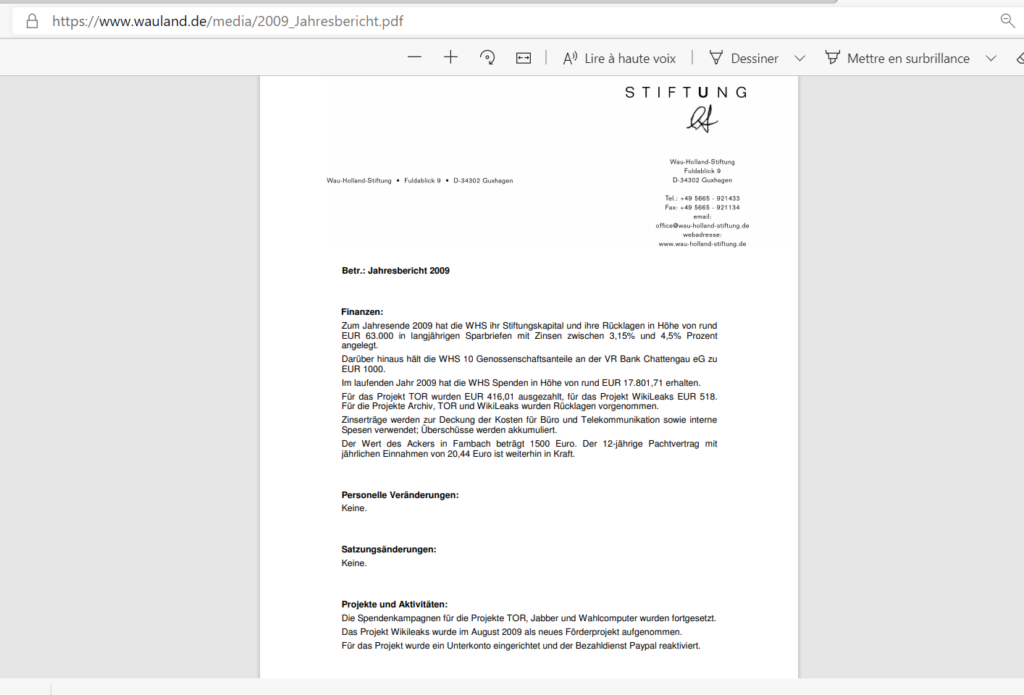
In 2009 the Wau Holland Foundation reports for the first time the amount of donations without specifying whether they are for the Tor project or Wikileaks: 17,801.71 Euros. However, under the heading « Project and activities » the sentence « The Wikileaks project was included as a new funding project in August 2009 » (« Das Projekt Wikileaks wurde im August 2009 als neues Förderprojekt aufgenommen ») is signed by Winfried Motzkus, president of the Wau Holland Foundation. It proves even more that Julian Assange is not the only one who should be responsible for the Wikileaks project[8].
[1] https://www.youtube.com/watch?v=Pt4Z9-cZlZU; https://www.youtube.com/watch?v=HAtFjT_W6Gc;
https://www.youtube.com/watch?v=FGUPCvfw97o; https://www.youtube.com/watch?v=xMtAL4DmeFQ;
[2] https://www.youtube.com/watch?v=xpWo1_-QI6Y
[3] « Im August 2009 wurde beschlossen, das Projekt Wikileaks zu fördern, indem wir ein Spendenportal einrichten und speziell auch über Internetbezahldienste das einfache Spenden aus dem Ausland ermöglichen. », Vorstandssitzung Protokoll des 28.12.2009 ; https://www.wauland.de/media/2009-12-28_Protokoll.pdf
[4] Dorota Dakowska « Le pouvoir des fondations, des acteurs de la politique étrangère allemande ». Presses Universitaires de Rennes, 2014, (« The power of foundations, actors of German foreign policy »)
http://pur-editions.fr/detail.php?idOuv=3468
[5] Brot fur die Welt, a Protestant association, thus organised and subsidised the World Social Forum in Tunisia in 2013 and 2015 within the framework of a contract with the German Ministry for Cooperation and the Friedrich Ebert Foundation, see Monika Karbowska « German foundations, an instrument of a particular imperialism in a globalised world »;
[6] https://netzpolitik.org/2011/kommentar-vorstand-schmeist-daniel-domscheit-berg-aus-dem-ccc/
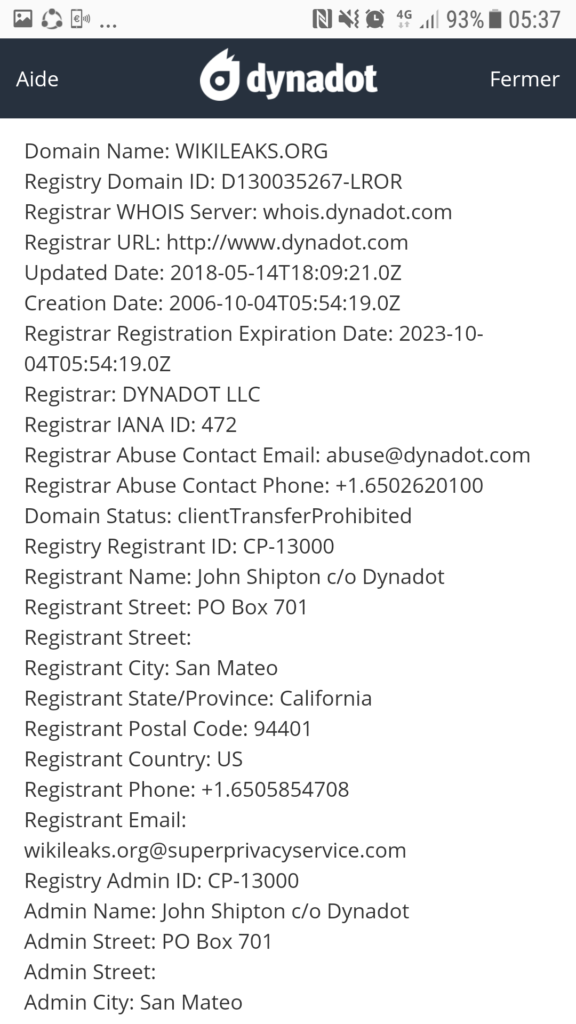
https://www.govinfo.gov/app/details/USCOURTS-cand-3_08-cv-00824/USCOURTS-cand-3_08-cv-00824-6
https://www.govinfo.gov/app/details/USCOURTS-cand-3_08-cv-00824/USCOURTS-cand-3_08-cv-00824-6
http://www.tlaxcala-int.org/upload/telechargements/331.pdf
[8] https://www.wauland.de/media/2009_Jahresbericht.pdf
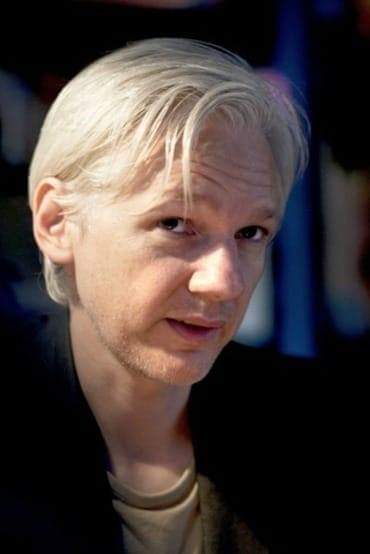
2010 and 2011 – Wau Holland Foundation leads the Wikileaks project
2010 is a crucial year for the Wau Holland Stiftung, because at this time the foundation’s activity will radically change dimension thanks to the « Wikileaks » project. The annual report 2010 still describes the same stable capital of 53,000 Euros placed in 3.5 and 4.5% investments. An additional 10,000 Euros will be invested and shares in the Chattengau Bank yield 1000 Euros. There is still the agricultural land with a value of 1500 Euros rented at 20.44 Euros[1]. The foundation’s equity capital is barely moving. This income is used to cover the old projects to which small amounts are allocated: 2200 Euros for Tor and 2300 Euros for the Jabber chat service[2]. The Hacker Archive project will be realised in partnership with a faculty of the University of Zurich and by the end of 2011 the foundation plans to rent a dedicated archive building in Berlin for which 12,000 Euros are budgeted for 2011 and a total sum of 51,000 Euros has been decided. It can be deduced that the project planned since 2004 has still not really started[3]. In 2011 the foundation is planning a training project for schoolchildren entitled « Chaos macht Schule » (« Chaos inside schools » for 10 000 Euros as well as the financial support to the regional structures of the Chaos Computer Club for 40,000 Euros[4]. The document does not mention a donation campaign dedicated to this project, so it can be estimated that the money will be taken from the total amount of donations received. 145,000 euros in donations will be placed[5], for the moment, in a single account at 1.5% before other possibilities can be studied.
For more than 145,000 Euros have been paid into the foundation’s accounts thanks to this key project, « Wikileaks ». « Die 2009 initiierte Spendenkampagne Wikileaks wurde erfolgreich fortgesetzt » – (« The Wikileaks fundraising campaign initiated in 2009 was successfully continued ») – This sentence appears on page 2 of the Annual Report, under the heading « Projekte und Aktivitäten », (« Projects and Activities »). The paragraph of the financial balance sheet mentions the sums : « Im laufenden Jahr 2010 hat die WHS Spenden in Höhe von rund Im laufenden Jahr 2010 hat die WHS Spenden in Höhe von rund 1.455.600 € erhalten. » [6]– « « In the current year 2010, WHS has received donations amounting to approximately 1,455,600 €.»
This money is most likely the « Wikileaks » project.
« Wikileaks » in 2010 exists through the work of Julian Assange and until September 2010 also through the work of Daniel Domscheit Berg. However, it is mainly Julian Assange who, through his media interventions, attracts the attention of the public to such an extent that the sum of 1,455,000 Euros has been obtained from the foundation’s accounts. From February to the end of April 2010 Julian Assange worked with Birgita Jonsdottir and other Icelanders, but he promoted Wikileaks in Norway alone on 26 April[7], in the documentary « the Whistleblower » by Mark Davis, broadcast on Australian television SBS on 17 May 2010[8], at the conferences at the Front line Club on 26 and 30 July 2010, on 25 October 2010[9]. On 18 April 2010 he presented Wikileaks at the Logan Foundation[10] and on 21 June 2010 at the European Parliament[11] alongside Birgitta Jonsdottir, who however is solely responsible for the Icelandic Act on the Protection of Whistleblowers and Journalists which she promotes in her country. Mark Davis’ second documentary « Inside Wikileaks », made in July 2010 in London, shows Julian Assange in collaboration with Sarah Harrison as bureau chief[12] and it is with her that he presents the « Irak Logs » at the press conference in Geneva on 4 November 2010[13].
Finally, he is alone in front of an audience of trade union and political activists and journalists who fill the hall of the Stockholm Trade Union House on 14 August 2010[14].
For the foundation, having to deal with a sudden influx of 1.5 million euros is a radical change of scale. The directors recognise this and write: « Es ist das bisher größte Projekt der Stiftung und stellt damit neue Anforderungen an die Abwicklung und das Controlling » – « « It is the foundation’s largest project to date and therefore places new demands on the processing and controlling ».
« In order to make long-term work possible, helpers and infrastructure must be engaged and developed in different countries. It is the largest project of the foundation so far and thus makes new demands on the handling and controlling. In order to successfully implement these requirements, the Foundation commissioned a Hamburg tax office with an expertise. From this, the Foundation developed contracts with the project manager which precisely regulate the reporting system. The extensive press work requires professional management that can also work in the long term. Therefore, larger reserves are necessary ».[15]
The Wau Holland Foundation is taking responsibility for the project that is well described as its own (« der größte Projekt der Stiftung »). It is only natural that in a project costing such a large sum of money and posing such immense challenges, a ‘professional management’ is engaged, just like a chartered accountant, and that agreements are signed with the project manager. It is also normal that the person with legal responsibility for the project should set up control and reporting rules.
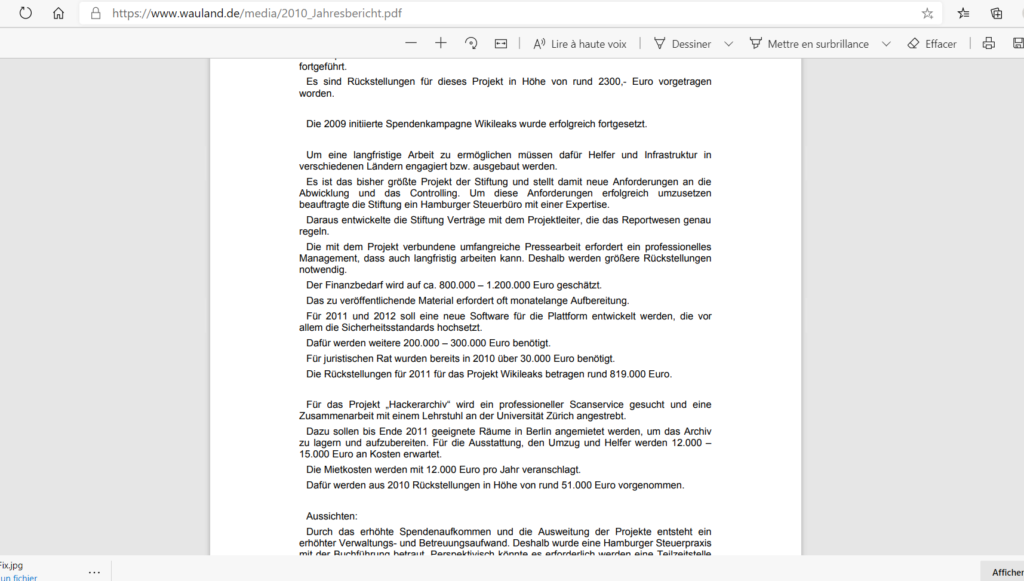
The name Julian Assange is not mentioned. Sarah Harrison’s intense work on the organisation of daily work as presented in the documentary « Inside Wikileaks » or Kristinn Hrafnsson’s continued presence alongside Julian Assange visible in media photos since october 2010, could indicate that one of them is the project manager. Oral agreements are frequent in the NGO world, but not when such sums are at stake. German political foundations, no matter how much criticizable their policies in poor countries might be, have the rule of establishing employment contracts for staff and paying for the services, including intellectuals, of subcontractors. In the IT world, not drawing up a written contract with a financial partner who is being approached to finance software, the development of an idea, would be tantamount to social suicide on the part of the project leader.
The Wau Holland Foundation may not have had the time to regulate in writing its collaboration with Julian Assange, who from 1 August to 27 September 2010 is in Sweden and is then monopolised by the publishing and media work and the legal proceedings he is undergoing. He will sign his contract as « project manager » – « ProjektLeiter » on 21 December 2010 and the details of this project implementation contract will therefore appear in the 2011 activity report[16]. On that day, Julian Assange will have spent 10 days in Wandsworth prison following the European arrest warrant drawn up by Sweden on 18 November 2010. When he signs the contract, he wears an electronic bracelet on his foot and has to live under house arrest under the responsibility of his guarantor. Finally, in April 2011, after 6 months of presence on British soil, he is required to apply for a residence card, and if he does not do so, he will be covered by the status of undocumented migrant. It is important here to highlight a social vulnerability that will rapidly worsen.
The budget for the « Wikileaks » project is set at « around 800,000 to 1,200,000 Euros. The financial requirements are estimated at approximately 800,000 – 1,200,000 euros. The material to be published often requires months of preparation. For 2011 and 2012, new software is to be developed for the platform, with high level safety standards. This will require a further 200,000 – 300,000 euros. For legal advice already in 2010 more than 30.000 Euro were needed. The provisions for 2011 for the Wikileaks project amount to around 819,000 euros »[17].
This budget is obviously unclear for those who use to work for NGOs and with financial documents required for exemple by funders such as the European Union or German political foundations. But one can understand the urgency in which a small foundation is put in a situation where its income grows exponentially without being prepared in terms of management. 200,000 to 300,000 Euros for IT is in 2010 the cost of a good management software developed to measure for a small company with 50 to 100 employees. The number of employees needed is not mentioned, but Julian Assange speaks in his interview of August 12, 2010 to the Swedish newspaper Aftonbladet about 5 employees hired, and no volunteers[18].
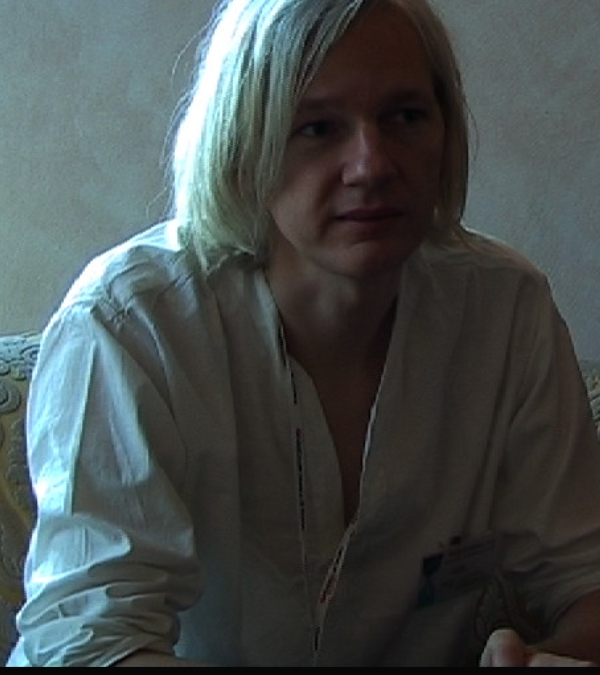
The document « Projekt 04: Informationsfreiheit verteidigen » Vorläufiger Transparenzbericht 2010 »– « « Project 04: Defending freedom of information » Preliminary transparency report 2010 »[19] tells us more about the origin of the donations but above all about the expenses of the foundation. Whether this expenditure concerned the « Wikileaks » project (which has since been named Projekt 04) can be seen from the subtitle « Campaigns and actions » on page 6: « Im Jahr 2010 wurden folgende Kampagnen / Aktionen durchgeführt (« « The following campaigns / actions were carried out in 2010 »): ● April 2010: Video-Produktion “Collateral Murder” ● Juli 2010: “War Diary: Afghanistan War Logs” ● [20]Oktober 2010: “War Diary: Iraq War Logs” ● November 2010: “CableGate: US Embassy Diplomatic Cables »[21].
These are the activities of the Wikileaks project.
We learn that the project’s income was 1,331,698.19 Euros and expenses 401,824.62 Euros. The Wau Holland Foundation announces that the Paypal account opened for the project until it was closed by Paypal on 4 December 2010 brought in 635,772.73 Euros. The largest payments were made in April 2010 (170,170.98 Euros), January (82,901.19 Euros) and December (102,623.29 Euros).
On 5 April 2010 the website Wikileaks.org published the famous « Collateral murder » video of the murder of 18 Iraqi civilians by US soldiers. December 2010 is the consecration after the publication in November of the 250 000 diplomatic documents of the United States, archives of 50 years of American diplomacy. But January 2010 is also a month of splendour when publications still only concern southern countries such as Kenya or Ivory Cost or subjects politically seen as marginal such as Scientology. The other months also report an excellent average of 34,000 to 60,000 Euros. The bank donations for Project 04 of the Wau Holland Foundation are as follows 695,925.46 Euros. Again, the largest amounts are paid in April (127,886.40 Euros), December (398,365.60 Euros), February (62,719.51 Euros) and August (27,335.13 Euros). The other months bring in a few thousand Euros each.
By country, we learn that it was the American citizens who contributed the most to the project (219,897.21 Euros), the Germans (91,336.21 Euros), the British (78,187.3 Euros), the Canadians (39,717 Euros) and the Australians (36,180.36 Euros). Under the term « others » are perhaps the citizens of countries not on the list, but which Julian Assange keeps saying in his 2010 lectures that they are the first moral owners of Wikileaks, those for whom the project is made, those who should take advantage of the information published to prosecute criminals and get them convicted, the countries that are victims of the attacks by the United States[22].
The citizen donor would certainly like to know how his or her money was spent. Page 6 of the document describes the following expenditure items:
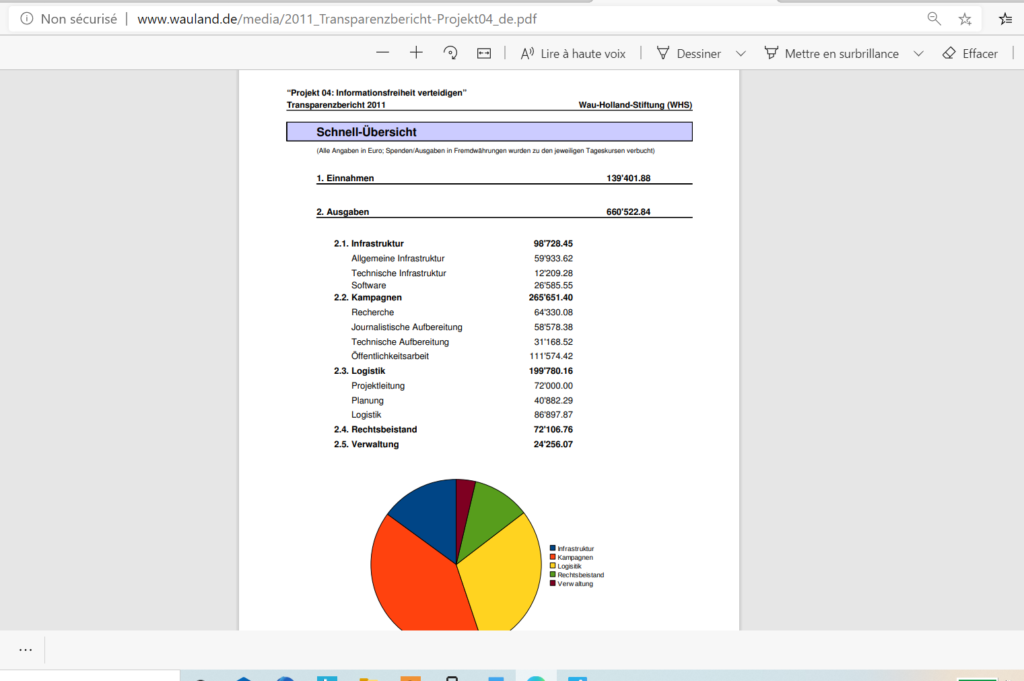
« Infrastructure costs include co-location of servers, server hardware, Internet connection, set-up costs and all other costs incurred for the operation of the hardware ».[23] As for the rental containing the documents of the 04 Wikileaks project, the foundation will pay 12,000 euros for the next 5 years. It is reasonable to assume that this item includes the payment of an IT employee, but the financial balance sheet is not precise enough to put a figure on the employee’s work.
The position « Campaign/Actions » mentions the necessary hiring of « external specialised staff » (« Externe Fachleute ») such as « journalists and editors » (« Journalisten/Redakteure »)[24]. « Costs in this area arise mainly in the preparatory screening and Processing of incoming materials, e.g. video editing, viewing and organising documents in large numbers according to subject areas and priority levels, anonymisation etc »[25]. The campaigns are cited and their costs are significant: 143 305 Euros[26].
The citizen donor did not get more precise answers to possible questions about the use of his money. The following questions remain: were the paid journalists those of the major media with whom Julian Assange collaborated for the publication of the documents (The Guardian, der Spiegel, Le Monde, El Pais, the New York Times…) or were they the daily office collaborators who appear in the documentaries (Sarah Harrison, Renata Avila, Joseph Farell)? Were these people employees, and if so, with what contracts? Normally, an NGOs financial report and activity report should contain its legal information and it should be public.
« Travel expenses € 62’053.31 : travel expenses are incurred for participation in conferences, meetings, lectures, meetings with press representatives and those responsible for the infrastructure. For the WikiLeaks activists, travel expenses were paid on the basis of receipts, usually economy class flights, 2nd class rail and medium-priced hotel accommodation. Often, however, no accommodation costs were incurred, as private accommodation was provided.»[27]
This sum seems realistic given the number of trips made, admittedly almost exclusively within the european space, although it is not known whether Julian Assange’s trip to his home country Australia from 15 May to 21 June 2010 was made in the context of his collaboration with the Wau Holland Stiftung. In the context of the document « Transparency », the reader is still unaware about the links between the funders and the real and physical person in charge of the 04 project.
The cost of « legal advice » is 32,944.95 Euros. The sum is large, but it seems realistic, given the enormous responsibilities involved in the risky action of publishing classified documents of the world’s leading power, which has military bases and a military command on German soil. There is no doubt that the leaders of the Wau Holland Stiftung have consulted specialist lawyers and no doubt politicians able to inform them of the danger to individuals when they reveal the secrets of the German government’s first partner in NATO. The question of the German government’s reaction to the actions of this small German foundation is also raised, even if it cannot be resolved by analysing only public financial documents. The presence of a German diplomat in room 9 of the Old Bailey watching a video of the debate on « Wikileaks », the subject of which is the fate of Julian Assange, also attests to Germany’s interest as a state in the Wikileaks project.
« Legal assistance € 32’944.95. Legal advice costs for project campaigns/actions were reimbursed, but not costs for personal legal advice or legal representation in court proceedings. Costs are incurred for advice on campaigns/actions (both before and after) and in case of imminent legal disputes »[28]. We do not know whether this sentence refers to the legal costs Julian Assange has to incur after being the subject of the complaints in Sweden. Julian Assange claims in the conference of 25 October 2010 to pay his lawyer’s fees alone and keep « Wikileaks » free of these costs. The 2011 activity report of the Wau Holland Foundation will be more explicit: « Legal fees (this does NOT include legal fees for Julian Assange because of the Swedish extradition request) »[29].
Reimbursement of expenses » amounts to up to 104,477.15 Euros. « For a small number of project leaders and activists, regular expense reimbursements were made after invoicing. The remuneration is based on the remuneration levels of Greenpeace Deutschland »[30]. We don’t know why Greenpeace is the model. But at a rate of 8706 Euros per month it is possible to pay 3 honorary salaries of 2900 Euros with social contributions. A French association would have been forced to pay its project managers because the payment of work on reimbursement of costs is illegal in France and considered as concealed work if it takes place over the long term on a project as in this case over one year. Donors requesting a financial audit from the Wau Holland Foundation for the 04 Wikileaks project may ask about German labour law under the EU Directive for Posted Workers, as the actual work on the project has been taking place since July 2010 largely in London.
The impression that emerges from these documents from the Wau Holland Foundation is that most of the publications of the 04 Wikileaks project were made in 2010, and this in an atmosphere of urgency and pressure. Looking back, however, it is difficult to understand the reasons for this urgency. The documents were submitted by the whistleblowers on the secure platform. Julian Assange, Daniel Domscheit Berg and the Icelandic team built the IT tools needed for this security as early as March 2010, perhaps even earlier. The documents submitted could well have remained there for one or two years more, enough time for the foundation to structure a stable, reliable and paid team.
This is the time that project manager Julian Assange would have needed to solve the problems of the legal proceedings that are coming down on him in Europe and which we have the right to think have a link with his activity as a political critic. Instead of working to solve these problems of repression in Sweden, Julian Assange is forced to leave this country where he has applied for a residence permit, signed a part-time work contract to go to Berlin on 27 September 2010 to a meeting with journalists from Spiegel and to follow the press conferences and presentations of the two following huge « scoops », the « Irak logs » and the « Cables Gate ». The public would have waited another year to learn of these revelations that there would have been no damage and the money stored by the donations could have waited a few more months on the foundation’s accounts. But on 8 December 2010 Julian Assange was imprisoned in Wandsworth Prison in London and the procedure for his extradition to Sweden was initiated under the European arrest warrant.
[1] « Zum Jahresende 2010 hat die WHS ihr Stiftungskapital und ihre Rücklagen in Höhe von rund € 53.000 in langjährigen Sparbriefen mit Zinsen zwischen 3,15% und 4,5% Prozent angelegt. Ein fällig gewordener Sparbrief in Höhe von 10.000 Euro soll wieder in einer Festanlage angelegt werden. Darüber hinaus hält die WHS 10 Genossenschaftsanteile an der VR Bank Chattengau eG zu 1000 €. € Im laufenden Jahr 2010 hat die WHS Spenden in Höhe von rund 1.455.600 € erhalten. Zinserträge werden zur Deckung der Kosten für Büro und Telekommunikation sowie interne Spesen verwendet. Die nicht gedeckten Kosten werden aus der freien Rücklage finanziert. Der Wert des Ackers in Fambach beträgt 1500 Euro. Der 12-jährige Pachtvertrag mit jährlichen Einnahmen von 20,44 Euro ist weiterhin in Kraft. 10 % oder rund 145.000 Euro werden der freien Rücklage zugeführt. Wir werden dafür Anlagemöglichkeiten prüfen. Bis dahin wird es auf dem Tagesgeldkonto zu 1,5 % gelagert », Annual Report 2010,
https://www.wauland.de/media/2010_Jahresbericht.pdf
[2] « Die 2007 initiierte Spendenkampagne für das Tor-Projekt wurde fortgesetzt. Für die Förderung der Öffentlichkeitsarbeit und die Infrastruktur werden 2200,- Euro in die Rückstellung übernommen.
Das Projekt Wahlcomputer pausiert zur Zeit, da die Einführung von Wahlcomputern zunächst aufgehoben wurde.Jabber Die Spendenaktion für Jabber konnte die Kosten dieses Services decken und wird fortgeführt. Es sind Rückstellungen für dieses Projekt in Höhe von rund 2300,- Euro vorgetragen worden. »
https://www.wauland.de/media/2010_Jahresbericht.pdf
[3] « Für das Projekt „Hackerarchiv“ wird ein professioneller Scanservice gesucht und eine Zusammenarbeit mit einem Lehrstuhl an der Universität Zürich angestrebt. Dazu sollen bis Ende 2011 geeignete Räume in Berlin angemietet werden, um das Archiv zu lagern und aufzubereiten. Für die Ausstattung, den Umzug und Helfer werden 12.000 – 15.000 Euro an Kosten erwartet. Die Mietkosten werden mit 12.000 Euro pro Jahr veranschlagt. Dafür werden aus 2010 Rückstellungen in Höhe von rund 51.000 Euro vorgenommen. », op.cit,
https://www.wauland.de/media/2010_Jahresbericht.pdf
[4] « Das Projekt „Chaos macht Schule“ wird voraussichtlich ein weiteres Förderprojekt in 2011. Dafür werden deshalb jetzt Rückstellungen in Höhe von 10.000 Euro vorgetragen.
Ein weiteres neues Projekt ist die Förderung der regionalen gemeinnützigen CCC e.V.- Strukturen. Dafür werden 40.000 Euro an Rückstellungen vorgenommen ».,
op.cit, page2, https://www.wauland.de/media/2010_Jahresbericht.pdf
[5] « 10 % oder rund 145.000 Euro werden der freien Rücklage zugeführt. Wir werden dafür Anlagemöglichkeiten prüfen. Bis dahin wird es auf dem Tagesgeldkonto zu 1,5 % gelagert. », op.cit, https://www.wauland.de/media/2010_Jahresbericht.pdf, page 1.
[6] Annual Report 2010, page 1 https://www.wauland.de/media/2010_Jahresbericht.pdf
[7] https://vimeo.com/17641356
[8] https://www.youtube.com/watch?v=gmZZHx_3_aA&feature=related
[9] https://www.frontlineclub.com/wikileaks_press_conference/
[10] https://www.youtube.com/watch?v=juWRddv-cgk https://www.youtube.com/watch?v=sIphxt42Ei0 https://www.youtube.com/watch?v=kYmzH38dinc
https://www.youtube.com/watch?v=ygjzFWryJ0I https://www.youtube.com/watch?v=oVWJnwEdmMM
[11] https://www.youtube.com/watch?v=wO8pclGN5II&feature=youtu.be&t=2h9m11s -European Parliament, 21.06.2010
[12] https://www.youtube.com/watch?v=QVPZsTSYhaY
[13] https://www.youtube.com/watch?v=kRtUeYDncYs
[14] https://www.youtube.com/watch?v=KcPlp5bNDKQ https://www.youtube.com/watch?v=h3BWmPDWk54 https://www.youtube.com/watch?v=fbZKI83ng8o https://www.youtube.com/watch?v=Gs6t4t6lofY https://www.youtube.com/watch?v=zFnXAj-CAV4
[15] « Um eine langfristige Arbeit zu ermöglichen müssen dafür Helfer und Infrastruktur in verschiedenen Ländern engagiert bzw. ausgebaut werden. Es ist das bisher größte Projekt der Stiftung und stellt damit neue Anforderungen an die Abwicklung und das Controlling. Um diese Anforderungen erfolgreich umzusetzen beauftragte die Stiftung ein Hamburger Steuerbüro mit einer Expertise. Daraus entwickelte die Stiftung Verträge mit dem Projektleiter, die das Reportwesen genau regeln. Die mit dem Projekt verbundene umfangreiche Pressearbeit erfordert ein professionelles Management, dassauch langfristig arbeiten kann. Deshalb werden größere Rückstellungen notwendig », page 2, https://www.wauland.de/media/2010_Jahresbericht.pdf
[16] https://www.wauland.de/media/2011_Jahresbericht.pdf
[17] « Der Finanzbedarf wird auf ca. 800.000 – 1.200.000 Euro geschätzt. Das zu veröffentlichende Material erfordert oft monatelange Aufbereitung. Für 2011 und 2012 soll eine neue Software für die Plattform entwickelt werden, die vor allem die Sicherheitsstandards hochsetzt. Dafür werden weitere 200.000 – 300.000 Euro benötigt. Für juristischen Rat wurden bereits in 2010 über 30.000 Euro benötigt. Die Rückstellungen für 2011 für das Projekt Wikileaks betragen rund 819.000 Euro » page 2, https://www.wauland.de/media/2010_Jahresbericht.pdf
[18] http://www.nnn.se/nordic/assange/docs/protocol.pdf; http://www.nnn.se/nordic/assange/docs/memoria.pdf
[19] https://www.wauland.de/media/2010_Transparenzbericht-Projekt04_de.pdf, page 3
[20] https://www.wauland.de/media/2010_Transparenzbericht-Projekt04_de.pdf, page 6
[21] « Die folgenden Spenden wurden durch Überweisung auf das Bank-Unterkonto des Projektes 04 der Wau-Holland-Stiftung getätigt und sind (summarisch) nach Monat aufgelistet », – page 5, https://www.wauland.de/media/2010_Transparenzbericht-Projekt04_de.pdf
[22] Page 4 https://www.wauland.de/media/2010_Transparenzbericht-Projekt04_de.pdf
[23] « Infrastrukturkosten umfassen Colocation von Servern, Serverhardware, Internetanbindung, Einrichtungskosten sowie alle weiteren Kosten, die für den Betrieb der Hardware anfallen »- op.cit, page 6, https://www.wauland.de/media/2010_Transparenzbericht-Projekt04_de.pdf
[24] « Kosten in diesem Bereich entstehen vor allem in der vorbereitenden Sichtung und Aufarbeitung von eingegangenen Materialien, z.B. Videobearbeitung, Sichtung und Ordnung von Dokumenten in grosser Zahl nach Sachgebieten und Prioritätsstufen, Anonymisierung etc. Die schliesst die Herbeiziehung externer Fachleute (z.B. Journalisten / Redakteure) ein » page 6, https://www.wauland.de/media/2010_Transparenzbericht-Projekt04_de.pdf
[25] page 6, https://www.wauland.de/media/2010_Transparenzbericht-Projekt04_de.pdf
[26] « Im Jahr 2010 wurden folgende Kampagnen / Aktionen durchgeführt: ● April 2010: Video-Produktion “Collateral Murder” ● Juli 2010: “War Diary: Afghanistan War Logs” ● Oktober 2010: “War Diary: Iraq War Logs” ● November 2010: “CableGate: US Embassy Diplomatic Cables » – op.cit, page 6,
[27] « Reisekosten/Spesen € 62’053.31, Reisekosten entstehen für die Teilnahme an Konferenzen, Meetings, Vorträgen, Treffen mit Pressevertretern und Verantwortlichen für die Infrastruktur. Für die WikiLeaks-Aktivisten wurden Reisekosten nach Belegen bezahlt, in der Regel Flüge Economy Class, Bahn 2. Klasse und Hotelunterbringung in mittlerer Preislage. Häufig fielen allerdings auch keine Übernachtungskosten an, da eine private Unterbringung erfolgte. », – page 6, https://www.wauland.de/media/2010_Transparenzbericht-Projekt04_de.pdf
[28] « Rechtsbeistand € 32’944.95. Es wurden anwaltliche Beratungskosten für Projekt-Kampagnen/-Aktionen erstattet, jedoch keine Kosten für personen-bezogene juristische Beratung oder antwaltliche Vertretung in Gerichtsverfahren. Kosten entstehen durch die Beratung bei Kampagnen / Aktionen (sowohl im Vorfeld als auch danach) und bei drohenden juristischen Auseinandersetzungen », page 6 , https://www.wauland.de/media/2010_Transparenzbericht-Projekt04_de.pdf
[29] « Rechtsberatungskosten (dazu gehören NICHT Anwaltskosten für Julian Assange wegen des schwedischen Auslieferungsantrags) » – page 2, Annual Report 2011 https://www.wauland.de/media/2011_Jahresbericht.pdf
[30] « Es wurden für einige wenige Projekt-Leiter und -Aktivisten regelmässige Aufwandsvergütungen nach Rechnungsstellung erstattet. Die Vergütungen orientieren sich jeweils an den Vergütungsstufen Die Vergütungen », page 6 https://www.wauland.de/media/2011_Jahresbericht.pdf
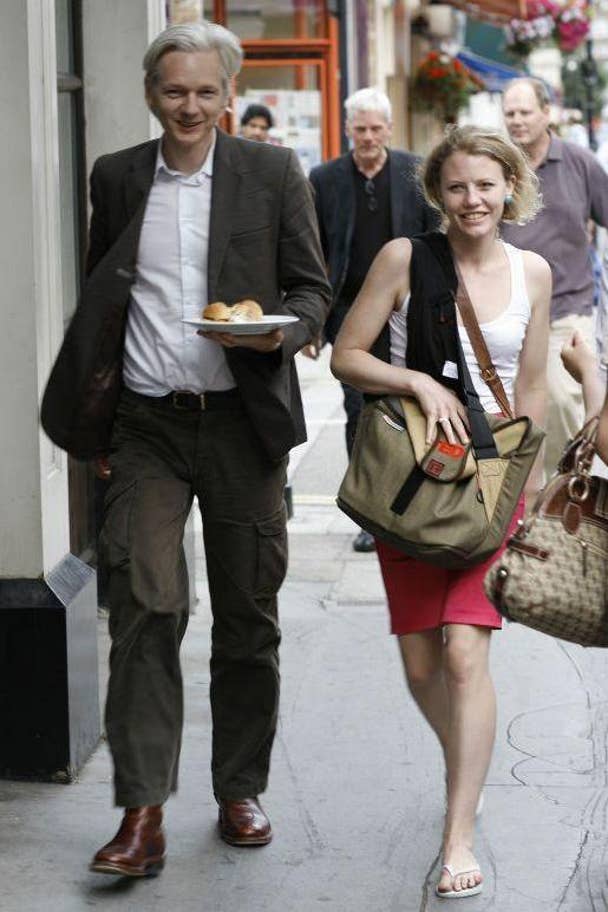
Legal and financial analysis of the Foundation’s 04 Wikileaks project for 2011 – Was Julian Assange an employee of Wau Holland ?
The key year 2011 sees the Wau Holland Foundation take on an unexpectedly international dimension thanks to the 04 Wikileaks project. Although the subsequent drying up of donations and the difficult situation of project manager Julian Assange will reduce the project’s dimension, the foundation will continue to act internationally in projects such as Zivilcourage or Tor. It is a pity, however, that we no longer have the minutes of the Board meetings for this crucial year.
We will therefore analyse here the annual report « Jahresbericht 2011 », the Annual Report 2011, the « Projekt 04: Informationsfreiheit verteidigen » – Transparenzbericht 2011 » (« Project 04: Defend freedom of information – Transparency report 2011 »), the financial report of the 04 Wikileaks project, the new statutes of 21 September 2011 and the model contract that the foundation signs with these project managers – « Projektauftrag zwischen der Wau-Holland-Stiftung und m nachfolgenden Projektleiter », (« Project contract between the Wau-Holland Foundation and hereinafter project manager »). This last document is published for the year 2012 but also concerns the activities of 2011.
« In 2011, in addition to Project 04 « WikiLeaks », the TOR and Chaos Macht Schule projects were supported by the foundation »[1] – this is the beginning of the 2011 annual report. We have learned that the head of the 02 Tor project « Anonymisation Network on the Internet » has been Andreas Lehner[2] for many years and that he has continued the work with a salary of 1750 Euros. The core business of the foundation, the training of young people and their parents in the field of IT, is carried out by the project « Chaos Macht Schule », « Chaos in the schools ». This project is an initiative of local groups of Chaos Computer Clubs who work locally with educational institutions in 11 cities in Germany. The activists of this project met on 28-30 November 2011 for a national meeting funded by the foundation. As a result, the foundation decided to implement project 05 « AlphaBITisierung » and dedicate a donation campaign to it. A workshop with children and young people has already been organised in Dresden. The sum of 2799.03 Euros has been spent there[3].
The report then goes into the core of the current activity, « Wikileaks » :
« Hilfspersonenvertrag und Beschreibung des Projekts 04. »- (« » Auxiliary staff contract and description of the project 04 »)[4]
« Am 21.12.2010 wurde zwischen der Stiftung und Julian Assange, dem Projektleiter des WHSProjekts 04 « WikiLeaks », ein Projektvertrag geschlossen » – «On 21.12.2010 a project contract was signed between the foundation and Julian Assange, the project manager of the WHS project 04 « WikiLeaks »[5] : Wau Holland has an obligation of « immediacy », i.e. to achieve its statutory objectives without delay. In order to facilitate this, the legislator allows it to hire or delegate its tasks to « auxiliary staff »[6].
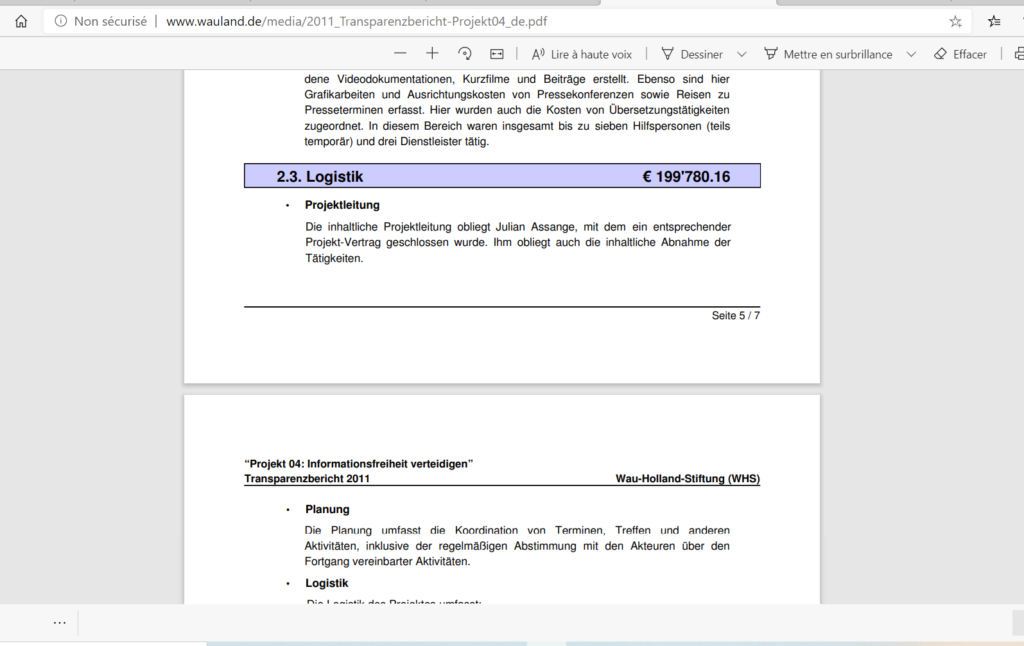
Thus the Wau Holland Stiftung is obliged to sign a project execution contract, « a project contract »- « Projektvertrag » with Julian Assange, who is project manager of Project 04 of the Wau Holland Stiftung « Wikileaks ». Here it should be pointed out that French law about project contracts includes only the recent « Indefinite duration project contract », which has long been used as a « construction contract » in the construction sector. This contract is clearly an employment contract, whereas in Germany, as in Eastern European countries, a private individual can sign a commercial service contract, called a « Werkvertrag » – « Contract for work » or a « Service contract ». German managerial literature and trade unions warn citizens against « Scheinselbständigkeit », « pseudo independence », i.e. signing a contract for work or services and finding oneself in the situation of a subordinate employee without the related protections[7].
The name of the contract that Julian Assange signs with the Wau Holland Foundation while under electronic bracelet and under house arrest is sufficiently vague to raise the question of whether it is a « work contract » where the product to be delivered is defined, the stages and ways of producing it, and where the client has the right to terminate the contract on his side if he is not happy with the product[8]? Or is it a « service contract » giving the greatest freedom to both sides but where each party remains the owner of its means of production and where the finished product belongs to both parties? Finally, it is the definition of « employment contract » – « Arbeitsvertrag » according to article 611a of the German Civil Code (Bürgerliches Gesetzbuch) that gives us the keys to understand which contract Julian Assange signed with the Wau Holland Stiftung to execute Project 04 « Wilkieaks » and whether it is or not an employment contract. This law article clearly specifies the notion of legal subordination of the employee to the employer in the context of « personal dependency » defined as the lack of possibility to decide on the content of the work, the way of working, the time and the place of work. The degree of dependence depends on the nature of the activity. But above all in deciding whether a contract of employment takes place, all conditions must be taken into account. If the concrete implementation of the contract shows that it is an employment relationship, the name of the contract does not matter[9].
To understand the extent of Julian Assange’s legal responsability in Project 04 of the Wau Holland Stiftung, we can rely on the detailed descriptions in the 2011 Annual Report: « This project contract defines the goals, tasks and rules that Mr. Assange is to realize in the foundation project 04 and whithin his project « WikiLeaks ». The content of these framework conditions was previously defined in numerous discussions since the first contact at the end of 2008. In August 2009, Project 04 was set up and the acquisition of donations began. WHS thus took over responsibility for essential parts of the overall Wikileaks project. The rules and procedures documented in the project management contract have been applied since the beginning of 2010. The objectives of Project 04 as a subset of the overall « WikiLeaks » activities were defined as follows: »[10]
Admittedly, this report is not the original of Julian Assange’s contract and it is difficult to analyse his legal relationship with the Wau Holland Stiftung without having access to this document, which is the key document for his current legal situation. We will therefore be obliged to complete this report with the model project contract that Wau Holland signs with its project managers in general and that it has published on its website for the year 2012. We will come back again to the question of why this contract is important in the extradition procedure for which Julian Assange is imprisoned today, in 2020. But what is clear from the start in this text is that the Wau Holland Foundation is assigning itself responsibility for the essential parts of the Wikileaks project. The notion of responsibility is not neutral in the civil code. In Europe the employer is criminally liable if he asks his employee to do something that is criminally reprehensible, such as supplying defective products, for example. The « false independence » which tends to dilute the responsibilities of the two unequal parties has also already been discussed in German society[11].
The question of « who is criminally responsible for Wikileaks » is the key to the extradition process that is taking place today. If Julian Assange is not criminally responsible for the publications for which he was the project manager but executing a contract of employment, others, the real culprits under the law, should be charged instead. Moreover, it should be pointed out that this contract, whether « work or services », could have released him from house arrest if his lawyers had taken his case to the British Court of Justice in order to change his pre-trial detention regime. Pending his extradition trial under the European arrest warrant, he could have appeared free, as do most Polish people and other Eastern Europeans who shared the court’s extradition lists with him, and for whom their lawyers fought hard[12].
[1] « Im Jahr 2011 wurden neben Projekt 04 « WikiLeaks » die Projekte TOR und « Chaos macht Schule » von der WHS unterstützt », page 1, Jahresbericht 2011. https://www.wauland.de/media/2011_Jahresbericht.pdf
[2] Andreas Lehner’s conference at the Chaos Computer Congress on TOR project, 2007.
[3] Page 1, https://www.wauland.de/media/2011_Jahresbericht.pdf
[4] « Hilfspersonenvertrag und Beschreibung des Projekts 04. Am 21.12.2010 wurde zwischen der Stiftung und Julian Assange, dem Projektleiter des WHSProjekts 04 « WikiLeaks », einProjektvertrag geschlossen. Dieser Projektvertrag definiert die Ziele, Aufgaben und Regeln, die Herr Assange im Stiftungsprojekt 04 und imRahmen seines Projekts « WikiLeaks » realisieren soll. Inhaltlich festgelegt wurden diese Rahmenbedingungen zuvor in zahlreichen Gesprächen seit dem ersten Kontakt Ende 2008. Im August 2009 wurde das Projekt 04 eingerichtet und mit der Spendenakquisition begonnen. Die WHS übernahm damit die Verantwortung für wesentliche Projektteile des Gesamtprojekts Wikileaks. Die im Projektleitervertrag dokumentierten Regeln und Prozeduren wurden bereits seit Anfang 2010 angewandt Die Ziele von Projekt 04 als Teilmenge der gesamten « WikiLeaks »-Aktivitäten wurden folgendermaßen definiert : », page 1, https://www.wauland.de/media/2011_Jahresbericht.pdf
(« On 21.12.2010, a project contract was signed between the Foundation and Julian Assange, the project manager of the WHS project 04 « WikiLeaks ». This project contract defines the objectives, tasks and rules that Mr. Assange is to implement in the Foundation’s project 04 and within the framework of his project « WikiLeaks ». The content of these framework conditions was previously defined in numerous discussions since the first contact at the end of 2008. In August 2009, Project 04 was set up and the acquisition of donations began. WHS thus took over responsibility for essential parts of the overall Wikileaks project. The rules and procedures documented in the project management contract have been applied since the beginning of 2010. The goals of Project 04 as a subset of the overall « WikiLeaks » activities were defined as follows »)
[5] https://www.wauland.de/media/2011_Jahresbericht.pdf, op. cit.
[6] http://www.der-vereinsmanager.info/index.php/beitrag-anzeige/hilfspersonen-und-gemeinnuetzigkeit.html
https://dejure.org/gesetze/AO/57.html
[7] https://www.freelancermap.de/blog/dienstleistungsvertrag-fuer-freelancer-das-muss-rein/
[8] https://www.firma.de/unternehmensfuehrung/was-ist-ein-werkvertrag-definition-und-erklaerung/
https://www.gesetze-im-internet.de/bgb/__631.html
https://www.gesetze-im-internet.de/bgb/__611.html
[9] « Der Grad der persönlichen Abhängigkeit hängt dabei auch von der Eigenart der jeweiligen Tätigkeit ab. Für die Feststellung, ob ein Arbeitsvertrag vorliegt, ist eine Gesamtbetrachtung aller Umstände vorzunehmen. Zeigt die tatsächliche Durchführung des Vertragsverhältnisses, dass es sich um ein Arbeitsverhältnis handelt, kommt es auf die Bezeichnung im Vertrag nicht an. », Artikel 611a des Zivilgesetztbuches
https://www.gesetze-im-internet.de/bgb/__611a.html
(« The degree of personal dependence also depends on the specific nature of the activity. In order to determine whether an employment contract exists, an overall consideration of all circumstances must be made. If the actual implementation of the contractual relationship shows that it is an employment relationship, the designation in the contract is irrelevant »)
[10] « Dieser Projektvertrag definiert die Ziele, Aufgaben und Regeln, die Herr Assange im Stiftungsprojekt 04 und im Rahmen seines Projekts « WikiLeaks » realisieren soll. Inhaltlich festgelegt wurden diese Rahmenbedingungen zuvor in zahlreichen Gesprächen seit dem ersten Kontakt Ende 2008. Im August 2009 wurde das Projekt 04 eingerichtet und mit der Spendenakquisition begonnen. Die WHS übernahm damit die Verantwortung für wesentliche Projektteile des Gesamtprojekts Wikileaks. Die im Projektleitervertrag dokumentierten Regeln und Prozeduren wurden bereits seit Anfang 2010 angewandt Die Ziele von Projekt 04 als Teilmenge der gesamten « WikiLeaks »-Aktivitäten wurden folgendermaßen definiert: », page 1 https://www.wauland.de/media/2011_Jahresbericht.pdf
[11] https://www.benjamin-lanz.de/2017/03/20/arbeitgeber-und-strafrechtliche-verantwortung-das-vorenthalten-von-arbeitsentgelt-266a-stgb/
[12] https://www.youtube.com/watch?v=PMtE6CPED2I;
Julian Assange’s speech on 24 February 2011
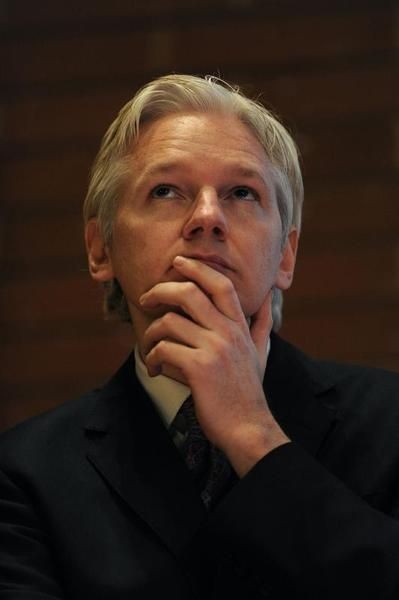
Julian Assange, a powerless performer in the Wau Holland Stiftung’s 04 Wikileaks project
The Annual report 2011 details the « objectives » of the Wikileaks project, which allows us to analyse in detail how the project is being carried out.
It is described as such:
« 2.1 Operation of an Internet platform. Development and operation of an appropriate global platform for the unrestricted technical implementation of the publication of whistleblower materials in order to promote freedom of information in accordance with the WHS Statutes »[1].
Portal or platform? « Portal oder Platform » in German. Legally it is not at all the same thing. In a platform the people exhibiting their products and services remain the owners of their products and services. In the Wikileaks project, however, the « whistleblowers » who sent in their documents lose control of their documents[2]. The question « who owns the documents published on Wikileaks » is significant, as it always involves the question of legal, and therefore criminal, responsability. As whistleblowers lose control of their documents once « Wikileaks » receives them, it is clear to me that « the 04 Wikileaks project » is a portal and not a platform.
« 2.2 Submitted information receipt, examination and publication of the submitted or forwarded information (both through journalistic preparation and necessary research) »[3].
« 2.3 Public relations. Public relations work for the platform in order to promote the primary concern of the foundation, freedom of information ».[4]
These first three objectives of the project are well described as contributing to the achievement of the foundation’s statutory objectives. In a few sentences, this description describes the entire work on « Wikileaks » in a nutshell. The foundation is therefore not leading a « sub-project » but the entire activity 04. This is confirmed by the foundation’s management in the official annual balance sheet submitted to the foundation’s supervisory authorities in the Land Hesse.
The « Role description and strategy » is even more clear:
« 2.4 Role description and strategy: In the strategic and tactical measures necessary to achieve these objectives, Mr Assange was given the freedom to decide on the details of implementation in accordance with 2.1 of the Treaty within the agreed framework and objectives (1.1, 1.2, 1.3 of the Treaty with Mr Assange it was decided that those activities directly financed by the Foundation would also be presented to the public under the name « WikiLeaks » in order to be able to use the name already introduced for fundraising»[5].
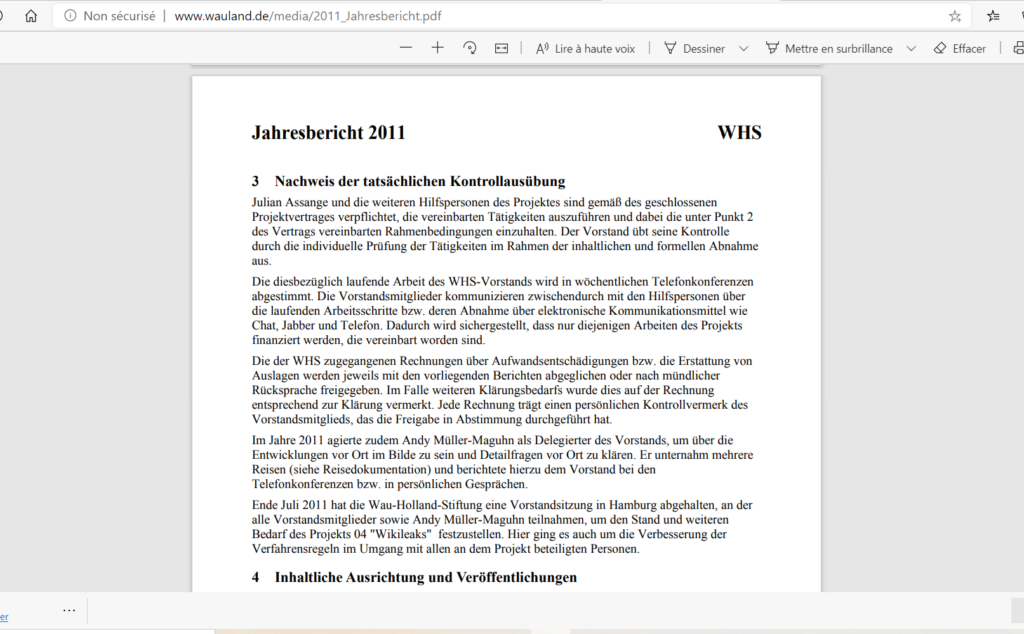
We can draw several conclusions from these two sentences. On the one hand, the foundation leaves Mr. Julian Assange free to decide on the details in the implementation of the project, only in order to succeed in the tactics thought by the foundation for the success of the project. This is the autonomy of daily action enjoyed by the executives of today’s capitalist companies, particularly project managers in the implementation of IT projects. But the foundation itself emphasises that it is all about « details ». For Mr. Assange, there is no question of changing the strategy and tactics of project implementation, nor is there any question of a « copyright » for him, of ownership of the concept, as would be required by a « Werkvertrag », a « work contract » under German law.
The second part of the point « description of roles and strategy » (the roles of each, therefore the role of Julian Assange on the one hand and the foundation on the other) decides that the public should only know the name « Wikileaks » because they are used to it because of the campaigns to collect donations and that it is a decision guided by the effectiveness of these campaigns under this name. In the description of its role, the foundation decided not to appear publicly but to highlight « Wikileaks ». The foundation has been so effective that for the past 10 years the public has been convinced that Wikileaks is a non-governmental association, an independent structure whose founder is Julian Assange. However, the foundation did not create an autonomous legal structure for the 04 Wikileaks project and Julian Assange, according to the document, is the manager of the foundation’s project and not the owner of the Wikileaks trademark or the president of an NGO with such a name.
Where it hurts is that donors are persuaded to give money directly to Julian Assange, on the basis of his lectures, after hearing his speeches and seeing his face. Would they see Winfried Motzkus, President of the Wau Holland Foundation in 2011 or Andy Müller Maguhn, President in 2020, that they might not react so enthusiastically and then hold the Wau Holland Foundation accountable. The question of the ethics of a German foundation that holds the objective of transparency of information is raised, especially as the Wau Holland Stiftung continues in 2019 and 2020 to collect money in the name of Julian Assange, even though it is almost certain that from where he is imprisoned he does not see the colour of it and does not decide on its usage. Collecting money for an opaque purpose in the name of a good cause and without providing transparent accounts can be considered here in Europe by citizens as a financial scam.
We cannot read points 1.1; 1.2 and 2.3 as well as article 2.1 of Julian Assange’s contract with Wau Holland, which stipulate the framework conditions for the execution of his work, because this document has not been published. Obviously this is a personal contract of a private person and although the foundation is legally obliged to make its annual report public, it is not obliged to publish employment contracts. However, according to his lawyers, Julian Assange no longer has access to personal documents that were stolen or lost when he was arrested on 11 April 2019. Julian Assange is in a dramatic situation, imprisoned as a hostage without having access to his personal belongings and documents, the Wau Holland Foundation, if it acted fairly and honestly, should therefore return a copy of this document to him, publish it or give it to human rights associations such as Wikijustice Julian Assange present at the 19 court appearances of Julian Assange since September 2019. Having been present and intending to return to the trial, I promise to do everything possible to force the court to include this essential document in Julian Assange’s file.
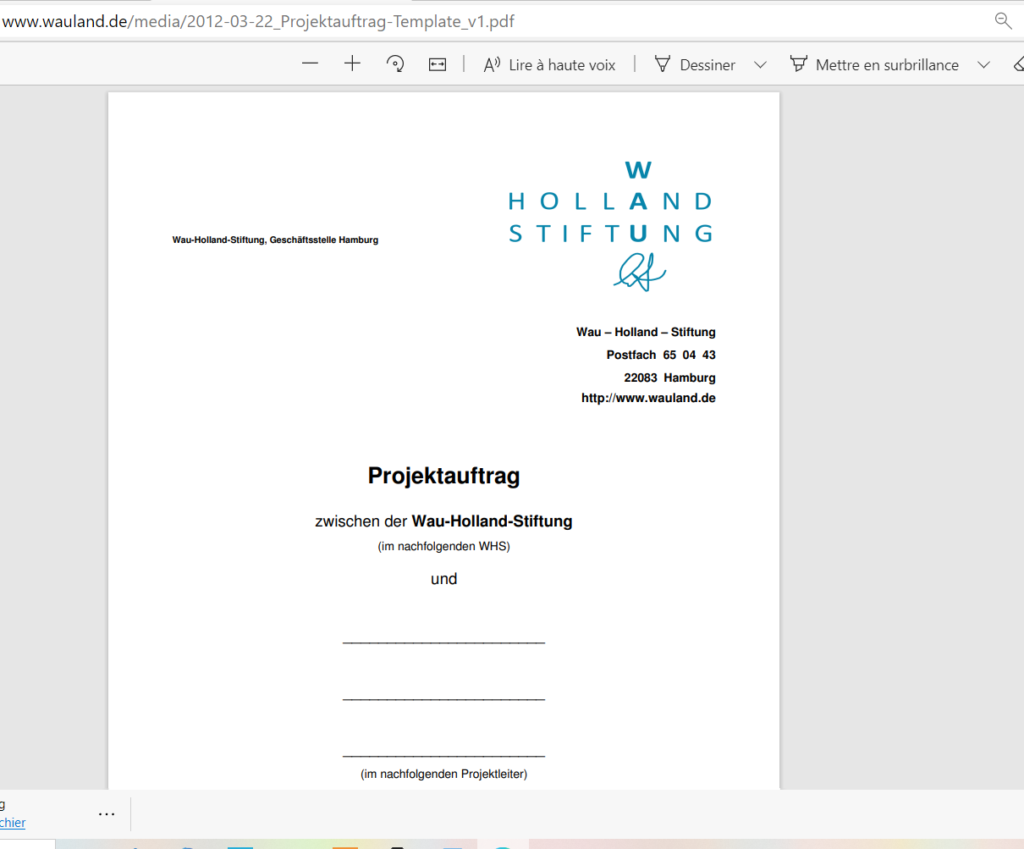
This document is essential because it contains a description of the legal responsibility that it shares with the principal, the Wau Holland Foundation. The way in which this responsibility is shared is laid down in this contract signed on 21.12. 2010. However, according to the « Model contract between WHS and the project manager(s) », which Wau Holland has drawn up for its other project managers, in points 1.1, 1.2 of the contract, the Foundation will not be able to guarantee that the project manager(s) will not be held liable for any loss or damage caused by the project : « In accordance with the aims of the Foundation as set out in the WHS statutes, the WHS commissions the above-mentioned project managers with the following tasks, for which the project managers develop strategic concepts for implementation and have these approved in writing by the WHS » .[6]
Therefore, as a rule, the project managers of the Wau Holland Stiftung have only limited freedom: their tasks – the realisation of the foundation’s project and what they put into it as their own ideas – must be approved in writing by the foundation’s management. This is not a partnership contract between two associations, nor is it a contract between an concept developer and a funder, nor is it a contract of employment for a senior executive. This description resembles that of a junior project coordinator position in a structure with a bureaucratic and meticulous operation.
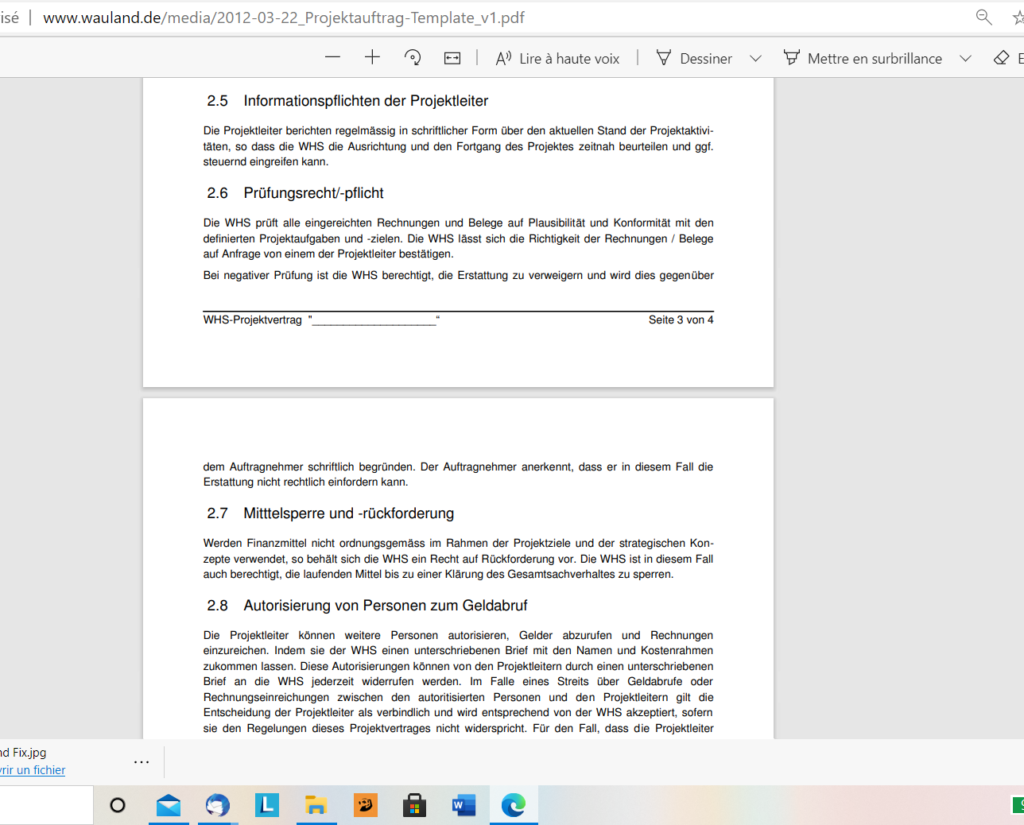
The chapter 2 of the model contract drawn up for its other project managers sets out very precisely the framework for their work, their obligations and their freedoms. Under the title « Guidelines and framework conditions », the foundation stipulates: « 2.1 Project strategy. The project managers are free to implement the agreed tasks; however, they inform the WHS in advance about the planned measures and activities. Changes in the project direction proposed by the project leaders during the course of the project must be approved by WHS and attached to this project contract in writing »[7]. Here the foundation establishes its ownership of the project’s purpose. It is the sole decision-maker, since changes have to be renegotiated and the contract resigned with it. Even tasks for which the project managers have decision-making autonomy, if they change their programme, they must inform the foundation’s management in advance. In my opinion, given my 15 years of experience working in the European voluntary sector and 5 years of work as a sales representative in an IT services company, this document has all the signs of an employment contract with little autonomy and a strong subordination to the structure carrying the project and owner of its concept.
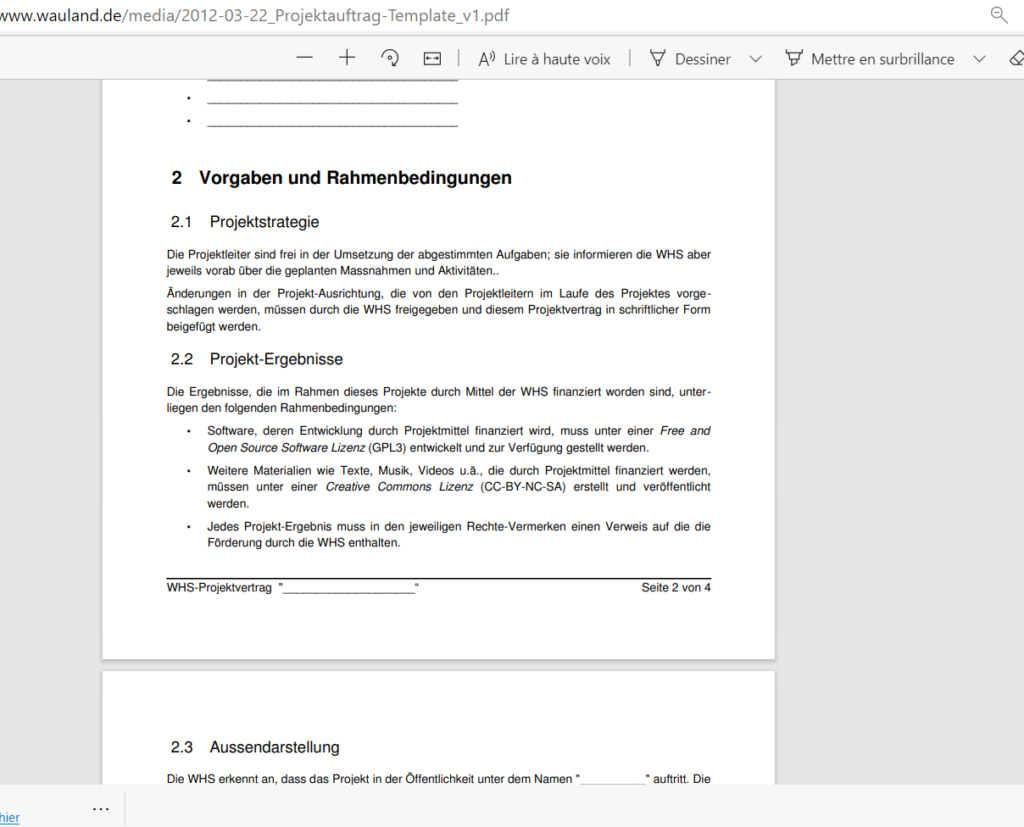
« 2.5 Financing. The following things are financed by the Foundation in Project 04 as long as earmarked donations are available[8]: – Infrastructure (hardware and software) and the development of software and workflows. – Reimbursement of expenses within the framework of the project. – Payment of the project leader and other auxiliary persons of the foundation. – Costs of campaigns and fundraising activities agreed upon in individual cases. – Legal fees (this does NOT include legal fees for Julian Assange because of the Swedish extradition request). – Structural costs and costs resulting from the growth of the project. – Usual running costs such as rent of office space and equipment. Donations in 2011 have fallen by 90% compared to 2010 due to the blocking of payments via PayPal, VISA and Mastercard as a result of the publication of the « cables » »[9].
The activity report 2011 therefore clearly indicates here that the foundation pays the costs of software development, and therefore finances dedicated computer specialists, because software does not develop itself. It also states that the project manager and the project collaborators will be paid, the amount will be mentioned later in the report. The report is precise enough to point out that the problems of Julian Assange’s legal proceedings are not covered by the foundation. He has to pay his lawyers with his emoluments while working on the project. If the sum is not enough, so much the worse for him. Writer Andrew O’Hagan reported on the state of stress in which Julian Assange was working throughout 2011[10]. This has to do with his status as a prisoner, but must also have something to do with the need to fulfil his contractual obligations with the Wau Holland Stiftung. His real social vulnerability was in 2011 hidden from the public by his media notoriety, but it is now coming to light because his current situation is only the consequence of the events of 2010 and 2011.
« 2.6 Monitoring . The project manager has a regular reporting obligation, which is primarily carried out in the form of encrypted Internet communication (chat) and is fulfilled with regular personal meetings. The Foundation is responsible for checking the submitted invoices, which have usually already been authorised by the project manager »[11].
In contrast to a real service contract, « Dienstleistungvertrag », or a « Werkvertrag », a « work contract » in which the product or service is checked by the client for conformity with its delivery, Julian Assange in his work as project manager is subject to regular monitoring by the Wau Holland Foundation. He has to carry out reporting by means of chats and physical meetings with representatives of the foundation. He can authorise project expenditure, but his decisions must be submitted to and approved by the foundation. In my opinion and from reading the Wau Holland Stiftung’s 2011 activity report, he therefore has the autonomy of a salaried project co-ordinator and not a service provider who can use his budget as he sees fit on condition that he delivers the product in due course.
Chapter 3 of the Wau Holland Foundation’s 2011 annual report is prolific on « evidence of actual control » of project implementation : « 3. Evidence of the actual exercise of control. Julian Assange and the other auxiliary persons of the project are obliged, in accordance with the concluded Project Contract, to carry out the agreed activities and to comply with the general conditions agreed under point 2 of the Contract. The Board of Directors exercises its control by checking the activities individually within the framework of the acceptance in terms of content and form. The ongoing work of the WHS Executive Board in this regard is coordinated in weekly telephone conferences.
The members of the board communicate in between with the auxiliary persons about the current work steps or their acceptance via electronic means of communication such as chat, jabber and telephone. This ensures that only those works of the project are financed which have been agreed. Invoices received by WHS for expense allowances or reimbursement of expenses will be checked against the available reports or released after oral consultation. In the event of any further need for clarification, this was noted on the invoice accordingly for clarification. Each invoice bears a personal control note from the member of the management board who approved it in consultation with the other board members. »[12]
In concrete terms, Julian Assange is obliged to carry out the project no matter what happens. What would happen if he can’t, the report is silent on the subject. According to the legal advice given to German « free lancers », a « work contract », « Werkvertrag », must include a clause that allows the service provider a way out when faced with the client’s power to terminate the contract at any time. Was Julian Assange free to withdraw from his obligations to Wau Holland Stiftung?
Since he does not live in Germany and does not have an EU residence permit in 2011, Wau Holland cannot demand the fulfilment of a legal contract when he is physically not on German soil. The European directive of posted workers applies to employees, the so-called Bolkestein Directive allows companies from one EU country to operate in another EU country, but Julian Assange, in 2011 is managing director of Sunshine Press Production, an Icelandic company, outside the EU. He also signs the project contract with Wau Holland as a private individual and not as the manager of this company. The foundation’s « Model Project Contract » of 2012 shows that the foundation is not flexible towards its other project managers: « In the event that the project managers are hindered in carrying out their role by external circumstances, WHS will delegate the project management to other persons and a new project contract will be concluded »[13]. The foundation gives itself the absolute right to dismiss its project manager and to replace him/her. German labour law and European legislation protecting workers seem to have been violated by the Wau Holland Foundation vis-à-vis its contractor or employee, the Australian Julian Assange.
As for the control process, it is continuous, detailed and meticulous. First of all, Julian Assange is controled « on form and substance » along the realisation of the project. Usually, in the NGO sector, when an organisation works with a person who has a certain notoriety in his or her milieu, who is the bearer of a know-how, it is customary to give him or her the freedom to organising his teams and work, possibly organising steering committees where work progress is presented and which serve as a control body. Here the Wau Holland Foundation states that it wants to control the way in which its employees work, which is just as much proof that its employees are employees and not « service providers ». The Board of Directors therefore monitors his work once a week by telephone and also gives itself the right to communicate regularly by chats and telephone with the members of the team managed by Julian Assange to ensure that « only work decided upon beforehand will be financed ». It is a strange partnership between NGOs where there is no trust between partners who are obviously very unequal.
The german foundation’s control of costs is almost obsessive in this chapter of the report – the provisional budget is drawn up in advance by the foundation, each cost has to be approved by the project manager Julian Assange and then presented to the foundation’s delegated project manager. If Julian Assange deviates from the provisional budget, which is ALWAYS the case for those who have managed complex international associative projects, he must explain this in advance. The necessary explanation is annotated on the cost with the name of the member of the foundation who would have accepted the expense. Julian Assange obviously does not have control over the budget of his project. A project manager with responsibility for his budget participates in drawing up the provisional budget in order to be sure that he has the means to carry out his work, hires teams himself or takes part in job interviews conducted by the commissioning organisation, incurs expenses on the basis of the provisional budget, signs contracts with suppliers, has means of payment and pays current expenses such as office and supply costs himself. If the budget is exceeded, he must of course refer the matter to the funders, but he is not monitored on a day-to-day basis for his current expenses. According to the document Annual Report 211, Julian Assange is a project executor within the Wau Holland Foundation without decision-making power. He should therefore not be held responsible for the failure or the realisation of the 04 Wikileaks project.
[1] « 2.1Betrieb einer Internetplattform Entwicklung und Betrieb einer geeigneten globalen Plattform für die uneinschränkbare technische Realisierung zur Veröffentlichung der Materialien von Whistleblowern, um damit die Informationsfreiheit im Sinne der Satzung der WHS zu fördern », page 2 Jahresbericht 2011, https://www.wauland.de/media/2011_Jahresbericht.pdf
[2] https://www.saadrachid.net/actualites/plateforme-vs-portail-web/
[3] « 2.2 Eingereichte Informationen .Entgegennahme, Prüfung und Publikation der eingereichten bzw. zugeleiteten Informationen (sowohl durch journalistische Aufbereitung als auch notwendige Recherche) ».Jahresbericht 2011, https://www.wauland.de/media/2011_Jahresbericht.pdf
[4] « 2.3 Öffentlichkeitsarbeit. Öffentlichkeitsarbeit für die Plattform, um das primäre Anliegen der Stiftung, die Informationsfreiheit, zu fördern », Jahresbericht 2011, https://www.wauland.de/media/2011_Jahresbericht.pdf
[5] « 2.4 Rollenbeschreibung und Strategie.Bei den notwendigen strategischen und taktischen Maßnahmen zur Erreichung dieser Ziele wurde Herrn Assange innerhalb der vereinbarten Rahmenbedingungen und Zielbeschreibungen (1.1, 1.2, 1.3 des Vertrags mit Herrn Assange) Entscheidungsfreiheit eingeräumt über die Einzelheiten der Umsetzung gemäß 2.1 des Vertrags. Es wurde beschlossen, dass auch diejenigen Aktivitäten, die direkt von der Stiftung finanziert werden, in der Öffentlichkeit unter dem Namen « WikiLeaks » dargestellt werden, um den bereits eingeführten Namen für die Spendenakquisition nutzen zu können ». op.cit, Jahresbericht 2011,
https://www.wauland.de/media/2011_Jahresbericht.pdf
[6] « Gemäss den Stiftungszielen in den Statuten der WHS beauftragt die WHS die oben genannten Projektleiter mit folgenden Aufgaben, zu denen die Projektleiter strategische Konzepte zur Umsetzung entwickeln und von der WHS schriftlich freigeben lassen », Projektauftrag Template, 22 March 2012,
https://www.wauland.de/media/2012-03-22_Projektauftrag-Template_v1.pdf
[7] «2. Vorgaben und Rahmenbedingungen. 2.1 Projektstrategie. Die Projektleiter sind frei in der Umsetzung der abgestimmten Aufgaben; sie informieren die WHS aber jeweils vorab über die geplanten Massnahmen und Aktivitäten.. Änderungen in der Projekt-Ausrichtung, die von den Projektleitern im Laufe des Projektes vorgeschlagen Die Projektleiter sind frei in der Umsetzung der abgestimmten Aufgaben; sie informieren die WHS aber jeweils vorab über die geplanten Massnahmen und Aktivitäten.. Änderungen in der werden, müssen durch die WHS freigegeben und diesem Projektvertrag in schriftlicher Form beigefügt werden », page 1, https://www.wauland.de/media/2012-03-22_Projektauftrag-Template_v1.pdf
[8] « 2.5 Finanzierung. Folgende Dinge werden durch die Stiftung im Projekt 04 finanziert, solange zweckgebundene Spenden verfügbar sind: • Infrastruktur (Hard- und Software) sowie Entwicklung von Software und Arbeitsabläufen. • Auslagenerstattung im Rahmen des Projekts. • Bezahlung des Projektleiters und weiterer Hilfspersonen der Stiftung.. • Kosten von im Einzelfall vereinbarten Kampagnen und Fundraisingaktionen. • Rechtsberatungskosten (dazu gehören NICHT Anwaltskosten für Julian Assange wegen des schwedischen Auslieferungsantrags). • Strukturkosten und Kosten, die aus dem Wachstum des Projekts resultieren. • Übliche laufende Kosten wie z.B. Miete von Büroräumen und Ausrüstung. Das Spendenaufkommen in 2011 ist gegenüber 2010 um 90% eingebrochen auf Grund der Blockade der Zahlungswege über PayPal, VISA und Mastercard als Folge der Veröffentlichung der « cables » », Jahresbericht 2011, page 2, https://www.wauland.de/media/2011_Jahresbericht.pdf
[9] https://www.wauland.de/media/2011_Jahresbericht.pdf, page 2
[10] https://www.lrb.co.uk/v36/n05/andrew-ohagan/ghosting
[11] « 2.6 Kontrolle .Dem Projektleiter obliegt eine regelmäßige Berichtspflicht, die primär in Form von verschlüsselter Internetkommunikation (Chat) wahrgenommen und durch regelmäßige persönliche Treffen vertieft wird. Der Stiftung obliegt die Prüfung der eingereichten Rechnungen, die in der Regel bereits vom Projektleiter autorisiert wurden », page 2, https://www.wauland.de/media/2011_Jahresbericht.pdf
[12] « 3 Nachweis der tatsächlichen Kontrollausübung Julian Assange und die weiteren Hilfspersonen des Projektes sind gemäß des geschlossenen Projektvertrages verpflichtet, die vereinbarten Tätigkeiten auszuführen und dabei die unter Punkt 2 des Vertrags vereinbarten Rahmenbedingungen einzuhalten.
Der Vorstand übt seine Kontrolle durch die individuelle Prüfung der Tätigkeiten im Rahmen der inhaltlichen und formellen Abnahme aus. Die diesbezüglich laufende Arbeit des WHS-Vorstands wird in wöchentlichen Telefonkonferenzen abgestimmt.
Die Vorstandsmitglieder kommunizieren zwischendurch mit den Hilfspersonen über die laufenden Arbeitsschritte bzw. deren Abnahme über elektronische Kommunikationsmittel wie Chat, Jabber und Telefon. Dadurch wird sichergestellt, dass nur diejenigen Arbeiten des Projekts finanziert werden, die vereinbart worden sind.
Die der WHS zugegangenen Rechnungen über Aufwandsentschädigungen bzw. die Erstattung von Auslagen werden jeweils mit den vorliegenden Berichten abgeglichen oder nach mündlicher Rücksprache freigegeben. Im Falle weiteren Klärungsbedarfs wurde dies auf der Rechnung entsprechend zur Klärung vermerkt. Jede Rechnung trägt einen persönlichen Kontrollvermerk des Vorstandsmitglieds, das die Freigabe in Abstimmung durchgeführt hat. », page 3, https://www.wauland.de/media/2011_Jahresbericht.pdf
[13] « Für den Fall, dass die Projektleiter durch äussere Umstände behindert sind, ihre Rolle auszuüben, wird die Projektleitung durch die WHS an andere Personen delegiert und ein neuer Projektvertrag geschlossen », page ,
https://www.wauland.de/media/2012-03-22_Projektauftrag-Template_v1.pdf
Andy Müller-Maguhn as the real director of the « Wikileaks » project
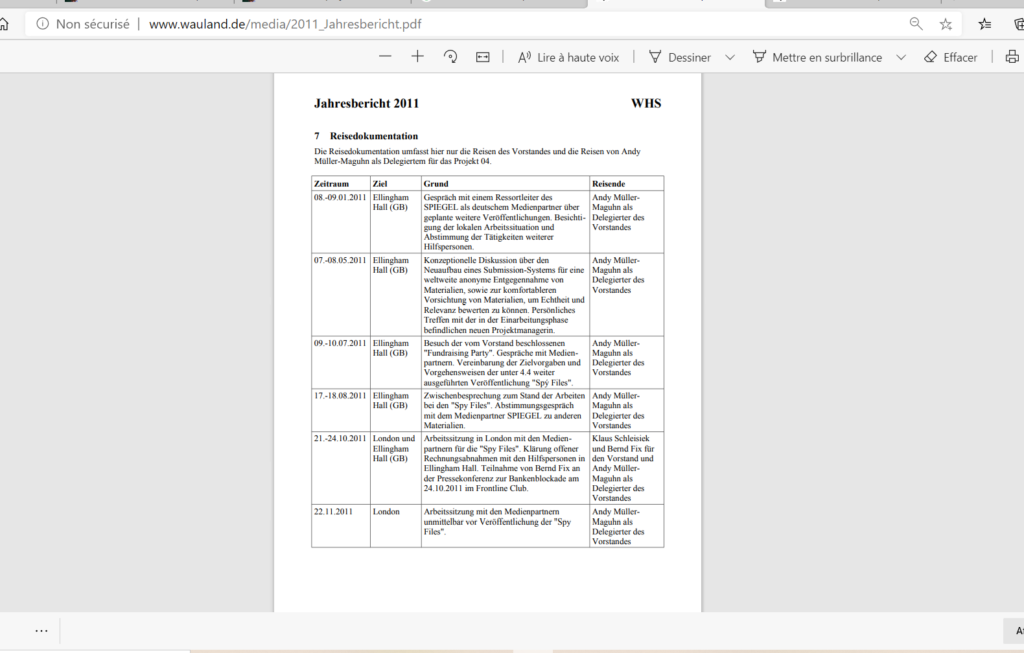
« In 2011, Andy Müller-Maguhn also acted as delegate of the Board of Directors to keep abreast of developments on the ground and to clarify detailed questions on site. He undertook several trips (see travel documentation) and reported to the Executive Board on this during the telephone conferences or in personal meetings. At the end of July 2011, the Wau-Holland Foundation held a board meeting in Hamburg at which all members of the Board and Andy Müller-Maguhn attended to assess the status and further needs of project 04 « Wikileaks ». The aim was also to improve the rules of procedure for dealing with all those involved in the project ».[1]
Page 6 of the annual report tells us on what dates and for what reasons Andy Müller Maguhn goes in 2011 to Ellingham Hall where he is received by the owner of the property Vaughan Smith, guarantor of Julian Assange in the context of his house arrest in pre-trial detention. In January 2011, Andy Müller Maguhn, delegate of the Board of Directors of the Wau Holland Foundation, will come to Ellingham Hall for the following reasons : « Discussion with a department head of the SPIEGEL as German media partner about planned further publications »[2]. He performs « an inspection of the local work situation and coordination of the activities of other support staff »[3]. In May 2011 he leads « conceptual discussion on the rebuilding of a submission system for a worldwide anonymous receipt of materials »(…)[4] He has also « a meeting with the new project manager (women), who is in the training phase ».[5] In July 2011 he performs « a visit of the « Fundraising Party » decided by the Board ».[6] He leads « discussions with media partners. » and takes decisions on «the agreement on the objectives and procedures of the publication « Spy Files » ».[7]
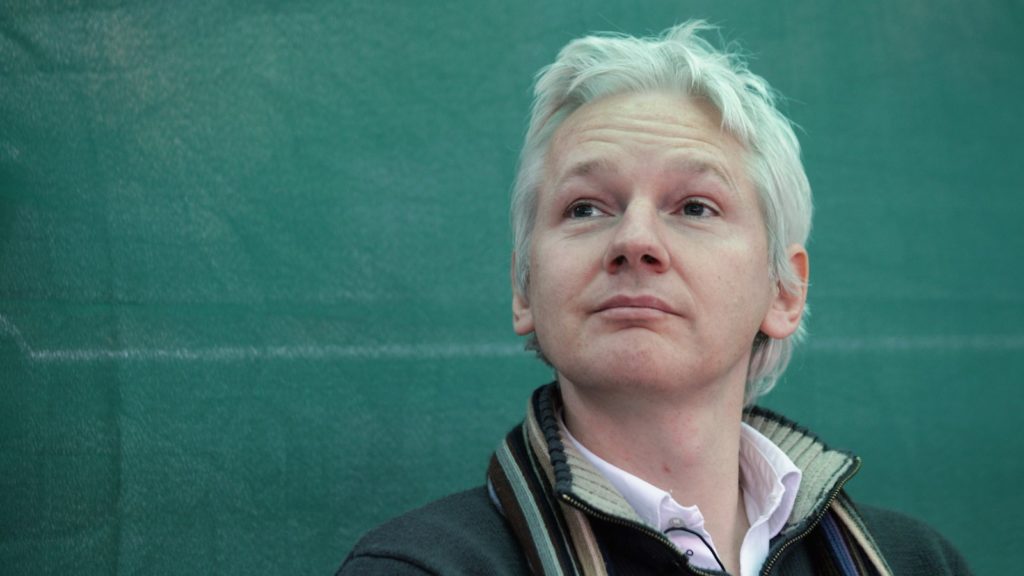
In August 2011 Andy Müller Maguhn will be leading the « intermediate discussion on the status of the work on the « Spy Files »[8] and the coordination meeting with the media partner SPIEGEL on other materials »[9]. Finally, from 21 to 24 October he returns from Germany to England with two other members of the Board of Directors, Klaus Schleisiek and Bernd Fix for a « working meeting in London with media partners for the « Spy Files ». Clarification of open invoice acceptances with the helpers in Ellingham Hall ».[10] Bernd Fix, member of the Board of Directors participates in a press conference at the Frontline Club about the lawsuit against bank blocking[11] . Finally, on 21 November 2011 Andy Müller Maguhn leads a « Working meeting with media partners immediately before publication of the « Spy Files » ».[12]
We cannot deduce from this report how the delegate of the Board of the Wau Holland Foundation controls the work of the project leader of the 04 « Wikileaks » project Julian Assange on the other publications, but he appears here acting as editor-in-chief with regard to the publication « Spy Files ». Moreover, he appears to be the main or even sole negotiator with the partner media and appears to be a decision-maker on the hiring of new employees such as the new project leader whose name remains hidden. Meanwhile, at the end of November 2011, Julian Assange lost all his appeals and has to appeal to the British Supreme Court against extradition to Sweden. On 1 December 2011 at the press conference launching the publication of the « Spy files », he is waiting to hear whether his appeal will be accepted by the Court[13]. He will also lose this case on 13 June 2012.
The concrete relationship between Board delegate Andy Müller Maguhn and Wau Holland’s « project manager » Julian Assange on the 04 « Wikileaks » project remains unclear in the foundation’s annual report, but the document gives us a description of what has been done under the title « Content orientation and publications » :
« In 2011, Project 04 was mainly concerned with 4 thematic complexes of public interest in addition to infrastructural work. In concrete terms, infrastructural work means an expansion of the server infrastructure, among other things for the decentralised viewing and commenting of submitted materials by media partners worldwide. The raw materials made available to media partners by WikiLeaks are first roughly screened. Then, as a rule, the research approaches that result are followed by the journalists themselves, so that complete reports emerge from this, ensuring that the materials are adequately presented in their context. The anonymised publication of the basic material is then generally synchronised and linked to the publications of the media partners »[14].
Also « this approach ensures the verification, contextualisation and protection of those affected ».[15]
Throughout the year, publications are published on the following countries: Brazil, Sri Lanka, Great Britain, Sweden, USA, Guatemala, Colombia, Ecuador, Egypt, Jordan, Yemen, Thailand, India. The publication of 2 February 2011 unveils the US destruction project of « Wikileaks ». On 25 April 2011 the « Guantanamo Files » and on 1 December 2011 the « Spy Files », the telecommunications surveillance documents, will be published.
The report presents the realisation of each activity. By comparing with the table on page 6, where the activities are quantified, it is possible to see how donor money was spent on the 04 « Wikileaks » project.
« Presentation of the fields of activity in project 04 » :
« 5.1 Administration ». These are the management costs on the foundation side: accounting, legal advice and travel expenses of the board members and delegates for project controlling. The day-to-day management of business (record keeping, payment management, banking relations) is carried out by the members of the Board of Directors on a voluntary basis[16]. The sum is 24,256 Euros. It includes the 6 trips of Andy Müller Maguhn and the trip of Klaus Scheisiek and Bernd Fix to England. This description shows that the Board of Directors has the means of payment, and therefore probably pays the salaries or emoluments of the project’s employees, whatever the contract under which they act.
« 5.2 Project management » : « The content of the project is managed by Julian Assange, with whom the contract mentioned in point 2 was concluded. He is also responsible for the acceptance of the activities »[17].
Julian Assange is therefore responsible for the content of the publications, but not certain aspects of the project organisation. According to the passages of the documents analysed above, he would not be responsible for the budget and the hiring of collaborators. To do this Julian Assange is, according to the grid on page 6, paid 72,000 Euros per year, or 6,000 Euros per month. This remuneration seems comfortable, but nothing is said about the payment of social contributions, health insurance, pension and unemployment insurance. According to the laws of the European Union, Julian Assange works for a German company while living in Great Britain. His status would therefore be that of a posted worker for a German company.
In this context the foundation has to pay contributions into a German social security fund. To do so, it must therefore issue Julian Assange with a residence permit for Germany, or use the one he already has when staying in the EU area, regardless of the country. If the foundation does not ensure that the foreign employee or service provider has this EU residence permit, he is simply « without papers » and the foundation will still have to pay the social contributions after the employee has been regularised with the administrative authorities, after a lawsuit at the labour court or after an intervention by the labour inspectorate and/or the trade unions. It is worth recalling here that the employment of migrants without paying their contributions is illegal under German and EU law. This illegal practice is denounced and combated by trade unions in Europe as undeclared work, the shameless exploitation of vulnerable workers, sometimes also a practice close to slavery. The German labour inspectorate should be called upon to establish the responsibility of the Wau Holland Foundation in the situation of Julian Assange as an undeclared foreign worker whose rights have not been respected.
« 5.3 Planning ». This term covers the organisation of meetings, the keeping of the agenda and the coordination of the programme of the different actors of the project in relation to the progress of the project. It is the management assistantship for which the sum of 40,800 Euros is mentioned. This sum can be used to largely remunerate a post at around 2000 to 3000 Euros per month[18].
« 5.4 Logistics » . This term includes : « the technical organisation of meetings and conferences, – Infrastructure for activities in the project, – Organisation of travel funds or travel, – Coordination and infrastructure for volunteer project staff. The Foundation has also recorded the travel of its delegates for the acceptance and control of work steps under the item logistics »[19].
This term covers therefore the aspects of event organisation (press conferences) which is very important in the editorial project of « Wikileaks ». Monitoring teams of volunteers can be a full-time management position, as in large NGOs. As for the Board delegate’s trips to England, these have already been mentioned in the « management » section, but it is possible that there were more of them in order to better control the « working steps » (« Arbeitschritte »). With the sum of 87,000 Euros per year, it is possible to employ two people at a salary of 2,500 Euros net per month while paying social security contributions of around 40% of the salary in addition.
« 5.5 Software ». « In order to achieve the project’s objectives, various developers have created components for the receipt, internal review and publication of materials in 2011. Most of these activities were honorary, in 2011 2 developers received remuneration for this. ».[20]
The work of the developers was therefore remunerated to the tune of 26,000 Euros, i.e. 13,000 Euros each.
« 5.6 Research ». « To verify the authenticity and relevance of the material received, 3 persons were employed in 2011, who also undertook several trips for this purpose. In order to understand foreign language material, another person was temporarily engaged in research »[21]. Unfortunately, we do not know what contracts these people were hired under or what language the fourth person worked with. The allocated sum of 64,330 Euros does not allow us to pay people working full-time for a year of 4 people with a correct salary. It can be assumed that these positions were temporary or half-time positions. The Wau Holland Foundation remains silent on the employment contracts it has drawn up for these people. I am astonished that the German labour inspectorate has not been called in to fill in this vagueness and check whether the hiring of these people was in compliance with the German labour code and/or European labour directives.
« 5.7 Legal advice. ». Two law firms were hired to « to assess the legal impact of publications » and to « secure collaboration agreements with media partners and to clarify tax issues »[22]. One law firm is British and the second German. Unfortunately, the document does not give the names. The large sum of 72,000 Euros was paid to them, but it is not known who the recipient law firms were that benefited from this manna of money from the donor citizen. There is no need to repeat here that Julian Assange’s appeal proceedings against the repression that plagued him are not covered by the 04 « Wikileaks » project. Julian Assange has only obligations towards the Wau Holland Stiftung and does not even benefit from its financial support against the repression of which he is a victim, whereas the citizens are convinced to help HIM by donating money to the Wau Holland Stiftung. Julian Assange’s work for Wau Holland is clearly an exploitation of the former by the latter and an abuse of social good vis-à-vis donors for the « Wikileaks » project.
« 5.8 Journalistic preparation.
« Various journalists were hired and their time and effort paid accordingly for the journalistic preparation, in particular the contextualisation of material received and the explanatory lighting of background and contexts. In 2011, a total of 6 journalists were thus employed as assistants in this area. »[23] The sum of 58,578 Euros was spent, i.e. 9,763 Euros per journalist. The document does not specify whether journalists from the partner media were paid or whether they were young journalists working solely for the project. Similarly, there is no indication of the type of contract they signed, let alone their names. However, if the money collected from the citizen is used to pay the salaries of journalists who subsequently « storytell » about « Wikileaks » or the person of Julian Assange, the citizen is entitled to know who carried out which task, for how much and with what money.
«5.9 Technical preparation »[24]. This is the physical work of putting stuff online. It was carried out by volunteers, who were nevertheless compensated 31,000 euros per year, or 2,583 euros per month, which is quite a large sum for voluntary work.
« 5.10 Public Relations ». « Besides Julian Assange, the public relations work is primarily coordinated by Kristinn Hrafnnson, the spokesperson engaged for this purpose. In addition, various video documentaries, short films and contributions were produced. Also included here are graphic work and the costs of organising press conferences and travel to press events. The costs of translation activities were also allocated here. A total of up to 7 auxiliary persons (some of them temporary) and 3 service providers were active in this area »[25].
This is the most important position. Kristinn Hrafnsson appears here in the role of media communications manager as we know her today.With 10 people, even if some of them are temporary, it is a whole team of professionals who have taken care of « Wikileaks » communication tools. Kristinn Hrafnsson is a managing shareholder of Sunshine Press Production, an Icelandic company that will become the exclusive subcontractor to the Wau Holland Foundation for the 04 Wikileaks project in 2014 and remain so until 2020[26]. During this period Julian Assange will no longer be able to run the company of which he is supposed to be the manager because of his confinement in Ecuadorian flat. It is possible that the service contracts mentioned here concern Sunshine Press Productions and that the 7 people hired will be hired through contracts with this company. The sum of 111,574 Euros seems significant, but divided by 12 months, remains a budget of 9297 Euros per month, comfortable but only allowing the hiring of 2 to 3 people on a stable basis.
« 5.11 Technical infrastructure »[27]. This term includes server installations on which documents are secured as well as all internet connections. In 2011 the servers were rented to 3 companies for the sum (rather modest compared to other expenses) of 12,000 Euros.
Under « 5. 12 General infrastructure », [28] the rental of several offices and conference facilities is mentioned. It was necessary to subcontract the organisation of press conferences to two companies. The total sum is 59,933 Euros and seems realistic if you count the people hired full time for the daily work in an office and the costs of renting rooms in London. The Foundation’s activity reports do not mention which rooms were involved: the conference room of the Frontline Club managed by the Frontline Club Charity Trust, a British structure subsidised among others by Georges Soros’ Open Society Foundation, whose headquarters are at 15A Norfolk Place in London[29], or the Elligham Hall residence where Julian Assange was imprisoned?
In total, the Wau Holland Stiftung’s 04 « Wikileaks » project cost 660,522 Euros in 2011. With the 400,000 Euros spent in 2010, two thirds of the donations collected at the start of the project in July 2010 have been used up. The number of people paid by the project can be estimated at between 11 and 25. The stable work place would be the project leader, the executive assistant, the secretariat (2 posts), IT services (estimated at a minimum of one full-time post), 3 research workplaces and 3 work places in the media centre – at least 11. If we add the payment of 6 journalists, the paid volunteers (evaluated at 1 full-time position) and counting all the 7 additional people mentioned as working for the media centre, the maximum figure of 25 people seems realistic.
Half a million euros still in reserve and donations will continue to flow in 2011, according to Wau Holland’s financial document. However, Julian Assange, while remaining project manager in 2012, will no longer receive any remuneration. The 2012 activity report announces that he has been working as a volunteer[30]. It is impossible to understand from reading these documents how his « project contract » with the foundation allows him to work without salary. There is every reason to believe that « work without payment under contract » is illegal. Under European law you cannot force someone to perform a task for free: doing so is forced labour, and therefore slavery. Forced labour is prohibited in all forms in the fundamental rights of all European countries, in the European Charter of Fundamental Rights and in the Universal Declaration of Human Rights. Voluntary work can be regulated by a special contract, but no coercion or punishment can be inflicted on the volunteer who is free to stop whenever he wants. Julian Assange in 2012 is already a prisoner held hostage in an ubuesque situation. To make him work for free on a project run by a German structure is a particular abuse on which light must be shed on. Those responsible for this situation and all those who profited from the money of the « Wikileaks Project » must assume the legal consequences of this responsibility.
The document « Project 04: Defending freedom of information -Transparency Report 2011 » is a financial report on the « Wikileaks » project[31]. For the expenditure part it includes the description and figures quoted in the activity report. For the income part, donations in 2011 amount to 139,401 Euros, an honourable sum but far from the success of 2010. The two best months are January 2011 (after the publication of the US diplomatic telegrams) and October (before the publication of the « Spy files »), at a rate of 29,000 Euros per month. In February, after the publication of the US documents against Wikileaks, 17,000 Euros were collected and the rest of the year the sums ranged from 1,200 Euros in April to 11,000 in June and 15,000 in December. We can see that the monthly sum is random and that the project therefore requires rigorous year-round management.
[1] « Im Jahre 2011 agierte zudem Andy Müller-Maguhn als Delegierter des Vorstands, um über die Entwicklungen vor Ort im Bilde zu sein und Detailfragen vor Ort zu klären. Er unternahm mehrere Reisen (siehe Reisedokumentation) und berichtete hierzu dem Vorstand bei den Telefonkonferenzen bzw. in persönlichen Gesprächen. Ende Juli 2011 hat die Wau-Holland-Stiftung eine Vorstandsitzung in Hamburg abgehalten, an der alle Vorstandsmitglieder sowie Andy Müller-Maguhn teilnahmen, um den Stand und weiteren Bedarf des Projekts 04 « Wikileaks » festzustellen. Hier ging es auch um die Verbesserung der Verfahrensregeln im Umgang mit allen an dem Projekt beteiligten Personen »., page 3, https://www.wauland.de/media/2011_Jahresbericht.pdf
[2] « Gespräch mit einem Ressortleiter des SPIEGEL als deutschem Medienpartner über geplante weitere Veröffentlichungen. », page 6, https://www.wauland.de/media/2011_Jahresbericht.pdf
[3] « Besichtigung der lokalen Arbeitssituation und Abstimmung der Tätigkeiten weiterer Hilfspersonen » ; page 6, https://www.wauland.de/media/2011_Jahresbericht.pdf
[4] « Konzeptionelle Diskussion über den Neuaufbau eines Submission-Systems für eine weltweite anonyme Entgegennahme von Materialien »,page 6, https://www.wauland.de/media/2011_Jahresbericht.pdf
[5] « Treffen mit der in der Einarbeitungsphase befindlichen neuen Projektmanagerin », page 6, https://www.wauland.de/media/2011_Jahresbericht.pdf
[6] https://www.wauland.de/media/2011_Jahresbericht.pdf, « Besuch der vom Vorstand beschlossenen « Fundraising Party »
[7] « Gespräche mit Medienpartnern. Vereinbarung der Zielvorgaben und Vorgehensweisen der unter 4.4 weiter ausgeführten Veröffentlichung « Spy Files », page 6, https://www.wauland.de/media/2011_Jahresbericht.pdf
[8] « Zwischenbesprechung zum Stand der Arbeiten bei den « Spy Files », page 6, https://www.wauland.de/media/2011_Jahresbericht.pdf
[9] « Abstimmungsgespräch mit dem Medienpartner SPIEGEL zu anderen Materialien » page 6, https://www.wauland.de/media/2011_Jahresbericht.pdf
[10] « Arbeitssitzung in London mit den Medienpartnern für die « Spy Files ». Klärung offener Rechnungsabnahmen mit den Hilfspersonen in Ellingham Hall. », page 6, https://www.wauland.de/media/2011_Jahresbericht.pdf
[11] « Teilnahme von Bernd Fix an der Pressekonferenz zur Bankenblockade am 24.10.2011 im Frontline Club », page 6, https://www.wauland.de/media/2011_Jahresbericht.pdf
[12] « Arbeitssitzung mit den Medienpartnern unmittelbar vor Veröffentlichung der « Spy Files » », page 6, https://www.wauland.de/media/2011_Jahresbericht.pdf
[13] https://www.youtube.com/watch?v=Q3zpLefXOP4
[14] « Im Jahre 2011 war das Projekt 04 neben infrastrukturellen Arbeiten vor allem mit 4 Themenkomplexen von öffentlichem Belang beschäftigt. Infrasturkturelle Arbeiten heißt konkret, ein Ausbau der Server-Infrastruktur, unter anderem für die dezentrale Sichtung und Kommentierung von eingereichten Materialien durch Medienpartner weltweit. Die von WikiLeaks den Medienpartnern zur Verfügung gestellten Rohmaterialien werden zunächst grob gesichtet. Dann werden in der Regel die Rechercheansätze, die sich ergeben, von den Journalisten selber verfolgt, so dass hieraus vollständige Berichte entstehen, die eine adäquate Darstellung der Materialien in ihrem Kontext sicherstellt. Die anonymisierte Veröffentlichung des Basismaterials erfolgt dann grundsätzlich synchronisiert und verlinkt mit den Veröffentlichungen der Medienpartner », page 3, https://www.wauland.de/media/2011_Jahresbericht.pdf
[15]« Durch diese Vorgehensweise ist die Verifizierung, die Kontextualisierung und der Schutz von Betroffenen sichergestellt. », page 3, https://www.wauland.de/media/2011_Jahresbericht.pdf
[16] « 5.1 Verwaltung Dies sind die Verwaltungskosten auf Seiten der Stiftung: Buchhaltung, Rechtsberatung und Reisekosten von Vorstandsmitgliedern und Deligierten für das Projektmonitoring. Die laufenden Verwaltungsgeschäfte (Aktenführung, Zahlungsmanagement, Bankgeschäfte) werden von Vorstandsmitgliedern ehrenamtlich geleistet. 5.2 Projektleitung Die inhaltliche Projektleitung obliegt Julian Assange, mit dem der unter Punkt 2 erwähnte Vertrag geschlossen wurde. Ihm obliegt auch die inhaltliche Abnahme der Tätigkeiten. », page 4 https://www.wauland.de/media/2011_Jahresbericht.pdf
[17] « Die inhaltliche Projektleitung obliegt Julian Assange, mit dem der unter Punkt 2 erwähnte Vertrag geschlossen wurde. Ihm obliegt auch die inhaltliche Abnahme der Tätigkeiten ». page 4, https://www.wauland.de/media/2011_Jahresbericht.pdf
[18] « 5.3 Planung Die Planung umfasst die Koordination von Terminen, Treffen und anderen Aktivitäten, inklusive der regelmäßigen Abstimmung mit den Akteuren über den Fortgang vereinbarter Aktivitäten », page 4,
https://www.wauland.de/media/2011_Jahresbericht.pdf
[19] « Die Logistik des Projektes umfasst: • Technische Ausrichtung von Treffen und Konferenzen, • Infrastruktur für Tätigkeiten im Projekt, • Organisation von Reisemitteln bzw. Reisen, • Koordination und Infrastruktur für ehrenamtlich engagierte Projektmitarbeiter. Unter dem Punkt Logistik hat die Stiftung auch die Reisen ihrer Delegierten für die Abnahme und Kontrolle von Arbeitsschritten erfasst », page 4, https://www.wauland.de/media/2011_Jahresbericht.pdf
[20] « Zur Verwirklichung der Projektziele haben im Jahr 2011 verschiedene Entwickler Komponenten für die Entgegennahme, die interne Sichtung und die Veröffentlichung von Materialien erstellt. Die meisten dieser Tätigkeiten waren ehrenamtlich, im Jahre 2011 haben 2 Entwickler hierfür eine Vergütung bekommen. », page 4,
https://www.wauland.de/media/2011_Jahresbericht.pdf
[21] « 5.6 Recherche Zur Verifizierung der Echtheit und Relevanz zugegangenen Materials waren im Jahre 2011 im wesentlichen 3 Personen beschäftigt, die hierfür auch mehrere Reisen unternommen haben. Zum Verständnis fremdsprachlichen Materials war temporär eine weitere Person mit Recherchen beschäftigt. », page 5, https://www.wauland.de/media/2011_Jahresbericht.pdf
[22] « 5.7 Rechtsberatung Zur Klärung der juristischen Bewertung eingegangenen Materials, der Sicherstellung der rechtlichen Unbedenklichkeit von Veröffentlichungen, der Gestaltung von rechtlichen Vereinbarungen mit Medienpartnern und Projektpartnern, sowie der Klärung fiskaler Fragen wurde im Jahre 2011 eine Kanzlei in England und eine in Deutschland engagiert. », page 5, https://www.wauland.de/media/2011_Jahresbericht.pdf
[23] « 5.8 Journalistische Aufbereitung. Zur journalistischen Aufbereitung, insbesondere der Kontextualisierung zugegangenen Materials und der erklärenden Beleuchtung von Hintergründen und Zusammenhängen, wurden verschiedene Journalisten engagiert und ihr Aufwand entsprechend vergütet. Im Jahr 2011 waren damit insgesamt 6 Journalisten als Hilfskräfte in diesem Aufgabenbereich tätig. », page 5, https://www.wauland.de/media/2011_Jahresbericht.pdf
[24] « 5.9 Technische Aufbereitung Im Vorfeld von Veröffentlichungen werden die Materialien technisch für die Verbreitung im Internet aufbereitet. Diese Tätigkeiten wurden im Jahre 2011 überwiegend ehrenamtlich erbracht, lediglich für eine besonders aufwändige Aufbereitung wurde die Tätigkeit honoriert. Die für die Organisation der ehrenamtlich Tätigen aufgelaufenen Aufwendungen wurden im Logistikbereich erfasst ». page 5, https://www.wauland.de/media/2011_Jahresbericht.pdf
[25]« Die Öffentlichkeitsarbeit wird neben Julian Assange primär von dem dafür engagierten Sprecher Kristinn Hrafnnson koordiniert. Zusätzlich wurden verschiedene Videodokumentationen, Kurzfilme und Beiträge erstellt. Ebenso sind hier Grafikarbeiten und Ausrichtungskosten von Pressekonferenzen sowie Reisen zu Presseterminen erfasst. Hier wurden auch die Kosten von Übersetzungstätigkeiten zugeordnet. In diesem Bereich waren insgesamt bis zu 7 Hilfspersonen (teils temporär) und 3 Dienstleister tätig ». page 5, https://www.wauland.de/media/2011_Jahresbericht.pdf
[26] https://www.wauland.de/media/2014_Jahresbericht.pdf
[27] « 5. 11. Unter der Bezeichung technische Infrastruktur sind hier nur die Serverinstallationen zur Organisation des Datenflusses erfasst. Die im Kontext angemieteter Räume organisierten Internetanschlüsse etc. sind als allgemeine Infrastrukturkosten verbucht. Im Jahre 2011 waren bei insgesamt 3 Internetdienstleistern Server untergebracht. », page 5, https://www.wauland.de/media/2011_Jahresbericht.pdf
[28] « 5.12 Allgemeine Infrastruktur Für die Tätigkeiten der engagierten Hilfspersonen und ehrenamtlich tätigen Helfer wurden im Jahr 2011 für mehrere Monate Büroräume angemietet, zum Teil fielen die Arbeiten auch während mehrtägiger Konferenzen an. Für diese Konferenzen wurden jeweils geeignete Räume mit Internet und Konferenzinfrastruktur angemietet. Im Jahr 2011 wurden hier von 2 Unternehmen Räumlichkeiten angemietet. », page 5, https://www.wauland.de/media/2011_Jahresbericht.pdf
[29] https://register-of-charities.charitycommission.gov.uk/ – Annual reports from 2003 until today
[30] « Projektleitung. Die inhaltliche Projektleitung obliegt Julian Assange, mit dem ein entsprechender Projekt-Vertrag geschlossen wurde. Ihm obliegt auch die inhaltliche Abnahme der Tätigkeiten. Diese Tätigkeit wurde im Jahr 2012 ehrenamtlich ausgeführt. », page 7, “Projekt 04: Informationsfreiheit verteidigen” Transparenzbericht 2012, Wau Holland Stiftung,
https://www.wauland.de/media/2012_Transparenzbericht-Projekt04_de.pdf
[31] https://www.wauland.de/media/2011_Transparenzbericht-Projekt04_de.pdf
The criminal, moral and financial responsibility of the managers of Wau Holland in the imprisonment of Julian Assange
To conclude our analysis, we would like to quote from the document of the new legal statutes of the Wau Holland Stiftung dated 21 September 2011 – « The Constitution of the Wau-Holland Foundation ». The new statutes establish the headquarters in Hamburg and the objects of the foundation as « education, culture, science, consumer protection and advice to consumers ». The foundation’s activities in connection with its statutory goals are described as continuing education in new technologies for young people and adults through the promotion of open source, culture (media and technology museum projects), and scientific activity. After mentioning the promotion of encyclopaedias on the internet, the foundation « promotes worldwide communication, freedom of information and civil courage. It promotes scientific work in the field of recent history of technology and media and research into the connection between social developments and communication media »[1]. – « Zivilcourage » can be translated from German as civic engagement or responsibility.
The « 04 Wikileaks project » and those that will follow it, as well as the « 07 Zivilcourage project » in support of the whistleblowers created in 2014, can thus enter into this convoluted formula[2].
The power within the foundation belongs to the Board of Directors of 5 persons which cannot be enlarged but only renewed by co-optation after defection. The President is primus inter pares. Decisions are taken by a majority of votes with a minimum of 3 people present. Decisions involving more than one third of the foundation’s capital must be taken by at least 4 persons including the president. In order to exclude a member, 2/3 of the votes are required, i.e. 3 out of 4, since the fifth would be the excluded member, an unprecedented situation.
On 25 March 2018 Andy Müller Maghun signs the 2016 report of the Foundation and this document shows that he is then president of the foundation. Today he is the « second president » after handing over to Klaus Peter Schleisieck, a computer scientist who campaigned at ATTAC Germany for universal income in 2017 and who participated in the direction of the 04 Wikileaks project in 2011 and 2012.
Bernd Fix today turned the page on « Wikileaks » and promoted Bitcoin at the Chaos Computer Club conferences. However, he should have been questioned about his responsibility for the 04 « Wikileaks project », which he and Andy Müller Maguhn so cleverly unloaded on the back of his former employee and worker for free, Julian Assange.
This is important not only because Julian Assange is suffering because of decisions he did not take, never having had any freedom in his collaboration with Wau Holland, but also because the « 04 » project continues from 2014 until today as a subcontracting that Wau Holland entrusts to Sunshine Presse Production :
The 2014 Annual report describes the following: « 5. Project 04 – Freedom of information In project area 04, the activities were restructured so that coordination with and control of the activities by the board of directors become easier. A framework contract for journalistic services was concluded with the media company Sunshine Press Productions EHF (SPP, Iceland). Since then concrete projects have been commissioned and invoiced according to the progress of work. The services include: Project coordination, technical preparation of the materials to protect whistleblowers and third parties (removal of meta information), review and contextualisation of the materials, preparation for publication on the Internet and communication with media partners. In 2014 the website wikileaks.org was also completely redesigned with a new submission platform and improved document search ».[3]
Every year, the same formula, or almost the same formula, is used to renew the « 04 » Wikileaks project in its subcontracting formula to the Icelandic company of Ingi Ragnar Ingasson and Kristinn Hrafnsson. However, the two Icelanders are quite rightly designated as « service providers » by the German project managers, while the president of the Wau Holland Stiftung signs the reports, thus authenticating its criminal, moral and legal responsibility in the eyes of the world, citizens and states.
The « 07 Zivilcourage project » which appears in the 2014 activity report can be identified with the « Courage Foundation » of which Andy Müller Maguhn is a « director [4]» and of which Julian Assange’s friend and collaborator on the « 04 Wikileaks project » Sarah Harrison was the « president » until 2017.
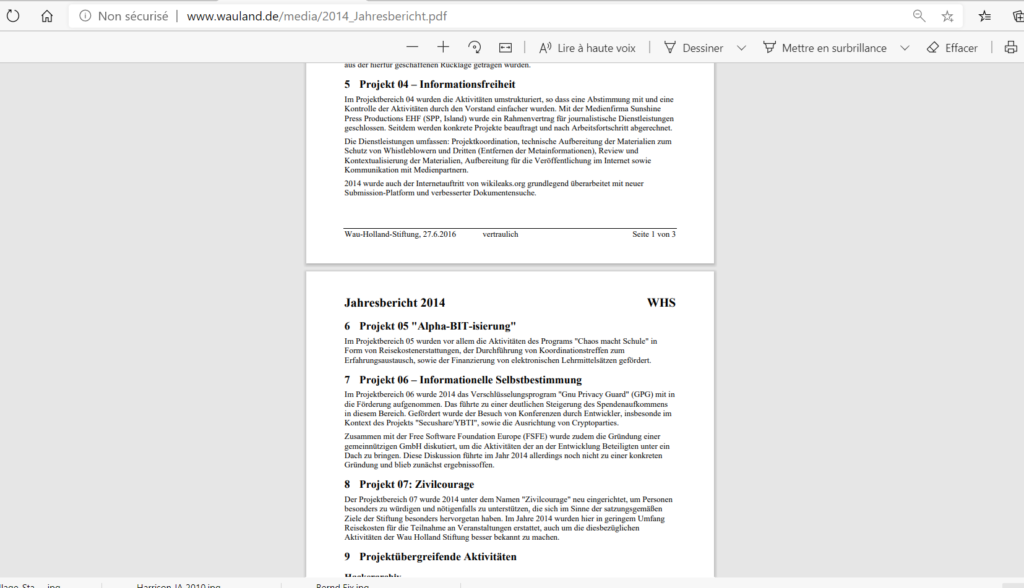
« 8. Project 07: Civil Courage. The Project Area 07 was newly established in 2014 under the name « Zivil Courage » in order to pay special tribute to and, if necessary, support persons who have distinguished themselves in the sense of the Foundation’s statutory objectives. In 2014, a small amount of travel expenses for participation in events was reimbursed here, also in order to make the activities of the Wau Holland Foundation in this area better known »[5].
We put the words « president » and « director » in between quotes because there are serious doubts about the legal structure of this organisation, which neither has an address in any European country, nor does it provide any legal documents or publish any report on its activities. The only contact is a form on the site and nobody ever replies to messages left. Wau Holland’s annual report for 2015 does mention a « collaboration with the Courage Foundation in Great Britain »[6], but the only « Courage Foundation » in the register of associations in Great Britain deals with children and has nothing to do with whistleblowers.
The only address visible on the site is the one under the name of the bank to which donors are invited to send money: The Chase Bank in New York – « Bank Account Courage Corp, account number 000 000 83 87 31 689, BIC SWIFT code CHASUS 33, Routing number IBAN 021 000 21, Reference: Courage Foundation, bank address Chase Bank, 270 Park Avenue, New York, NY 100 17, USA. Recipient address: Courage Foundation, 201, Varick Street, PO. Box #766, New York , USA »[7].
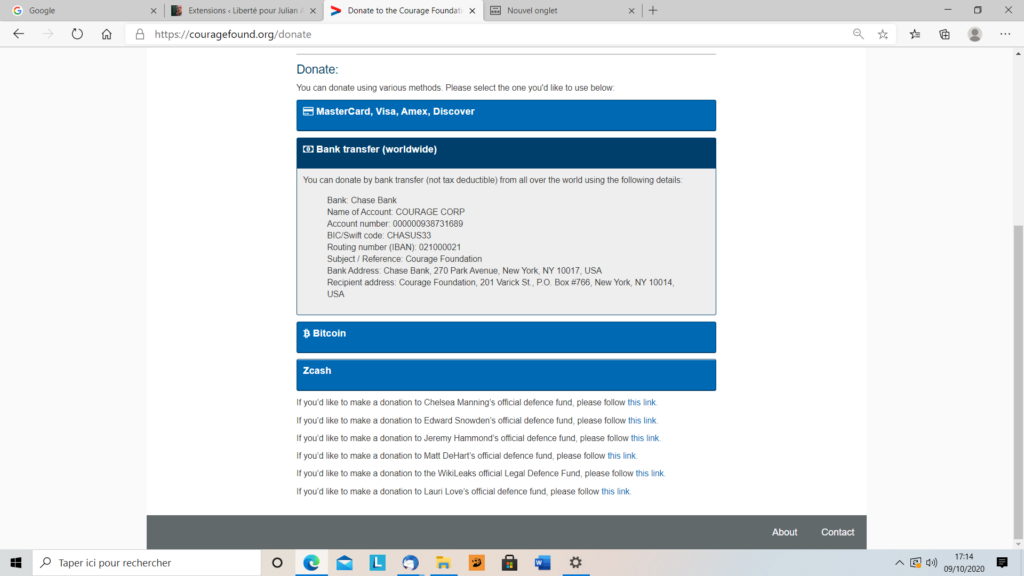
The address of the bank to which citizens are invited by Andy Müller Maguhn and other leaders[8] to send their money to support Julian Assange and other whistleblowers is not in Europe, but in the United States, which can only come as a surprise, given that this country is particularly hostile to « Wikileaks » and is pursuing Julian Assange for criminal allegations. The recipient bank is the major American bank Chase Manhattan Bank and the address of the account of the « Courage Corp » is Park Avenue. But it gets worse: the mailing address of the Courage Foundation is 201 Varick Street in New York City, an office belonging to the US federal state in which the Immigration Court is located, but also the National Urban Security Technology Laboratory part of United States Department of Homeland Security ![9]
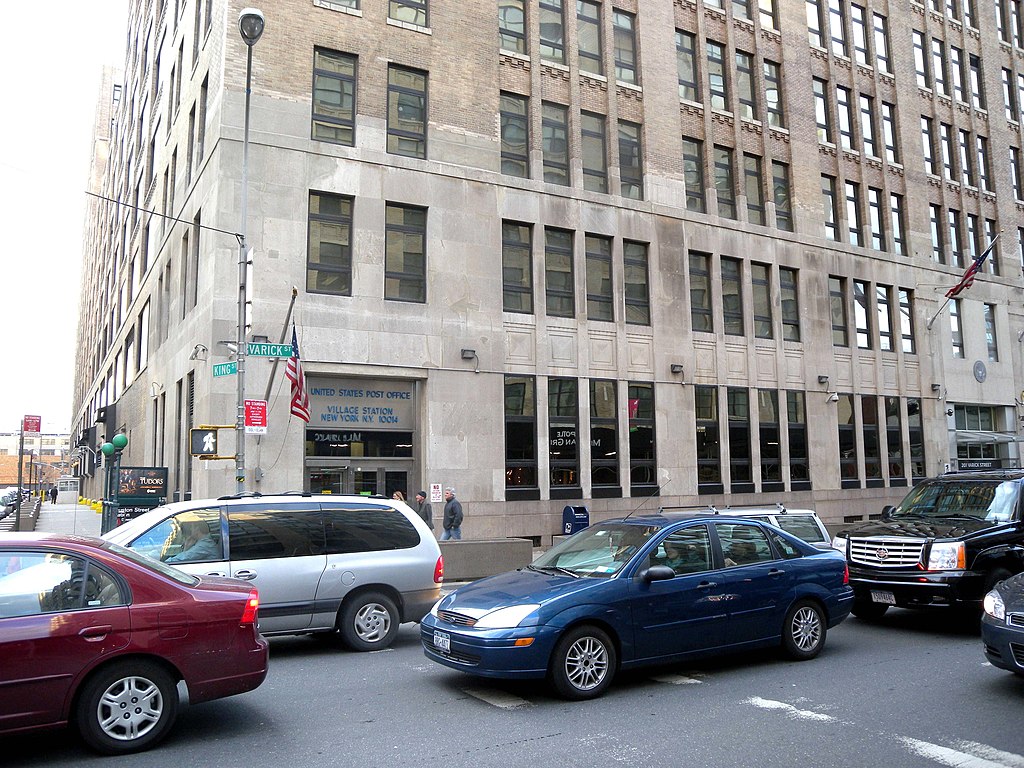
But there are worse things! The « Courage Foundation or Courage Found » was not found in the registers of German, French or British NGOs. But it does not exist in the registers of NGOs in New York State either. On the other hand, the « Courage Corp » does exist as a private company, a « Domestic Business Corporation », created on 30 May 2017 and registered under DOS ID number 5145362 in the New York Department of State Division of Corporation[10]. The address of its registered office is that of its manager Nathan Fuller, 2790 Brodway, apt. 4D, 100 25, New York.
In the United States, as in Europe, the law obliges charitable organisations and non-governmental organisations that live from donations to submit their accounts to a supervisory authority and to make them public. Citizens’ money must be used for the purpose stated in the legal statutes of these structures and the public must have the means to verify this. Any use of citizens’ money for another purpose is an abuse of social good. So what can be said about the maintenance of a private capitalist profit-making enterprise with citizens’ money? This kind of practice is condemned by law and morals in our capitalist societies. A « business » must sell services and goods and cannot live on public charity.
The Courage Corp, its leaders and those who encourage donations to Courage Corp are thus committing an abuse of social good, perhaps even a scam by collecting donations from citizens who want to help whistleblowers. This is all the more serious as the US business entity Courage Corp masquerades as a charity, the Courage Foundation, an entity that in reality does not legally exist anywhere. It is time for the judicial authorities to remind the leaders of these structures, both Nathan Fuller in New York and Andy Müller-Maguhn in Germany to their responsbility. Müller-Maguhn, who appeals to the generosity of European citizens to make donations to a private American business enterprise, cannot escape his legal responsibility, all the more so as he remains today a leading member of the Board of Directors of the Wau Holland Stiftung, a foundation with its headquarters in Hamburg, which is listed in the registers of foundations of the Free City of Hamburg[11].
[1] « Sie fördert die weltweite Kommunikation, Informationsfreiheit und Zivilcourage. Sie fördert wissenschaftliches Arbeiten im Bereich neuerer Technik- und Mediengeschichte und die Erforschung des Zusammenhangs gesellschaftlicher Entwicklungen und Kommunikationsmedien ». page 1,
https://www.wauland.de/media/2011-09-21_Verfassung-WHS.pdf
[2] https://www.wauland.de/media/2014_Jahresbericht.pdf
[3] http://www.wauland.de/media/2014_Jahresbericht.pdf
« 5 Projekt 04 – Informationsfreiheit Im Projektbereich 04 wurden die Aktivitäten umstrukturiert, so dass eine Abstimmung mit und eine Kontrolle der Aktivitäten durch den Vorstand einfacher wurden. Mit der Medienfirma Sunshine Press Productions EHF (SPP, Island) wurde ein Rahmenvertrag für journalistische Dienstleistungen geschlossen. Seitdem werden konkrete Projekte beauftragt und nach Arbeitsfortschritt abgerechnet. Die Dienstleistungen umfassen: Projektkoordination, technische Aufbereitung der Materialien zum Schutz von Whistleblowern und Dritten (Entfernen der Metainformationen), Review und Kontextualisierung der Materialien, Aufbereitung für die Veröffentlichung im Internet sowie Kommunikation mit Medienpartnern. 2014 wurde auch der Internetauftritt von wikileaks.org grundlegend überarbeitet mit neuer Submission-Platform und verbesserter Dokumentensuche ».
[4] https://www.couragefound.org/tag/andy-muller-maguhn/
[5] « 8 Projekt 07: Zivilcourage Der Projektbereich 07 wurde 2014 unter dem Namen « Zivilcourage » neu eingerichtet, um Personen besonders zu würdigen und nötigenfalls zu unterstützen, die sich im Sinne der satzungsgemäßen Ziele der Stiftung besonders hervorgetan haben. Im Jahre 2014 wurden hier in geringem Umfang Reisekosten für die Teilnahme an Veranstaltungen erstattet, auch um die diesbezüglichen Aktivitäten der Wau Holland Stiftung besser bekannt zu machen »
http://www.wauland.de/media/2014_Jahresbericht.pdf
[6] http://www.wauland.de/media/2015_Jahresbericht.pdf
[7] https://www.couragefound.org/donate/
[8] https://www.justice.gov/eoir/new-york-varick-immigration-court
https://en.wikipedia.org/wiki/National_Urban_Security_Technology_Laboratory
[9] https://www.couragefound.org/advisory-board/
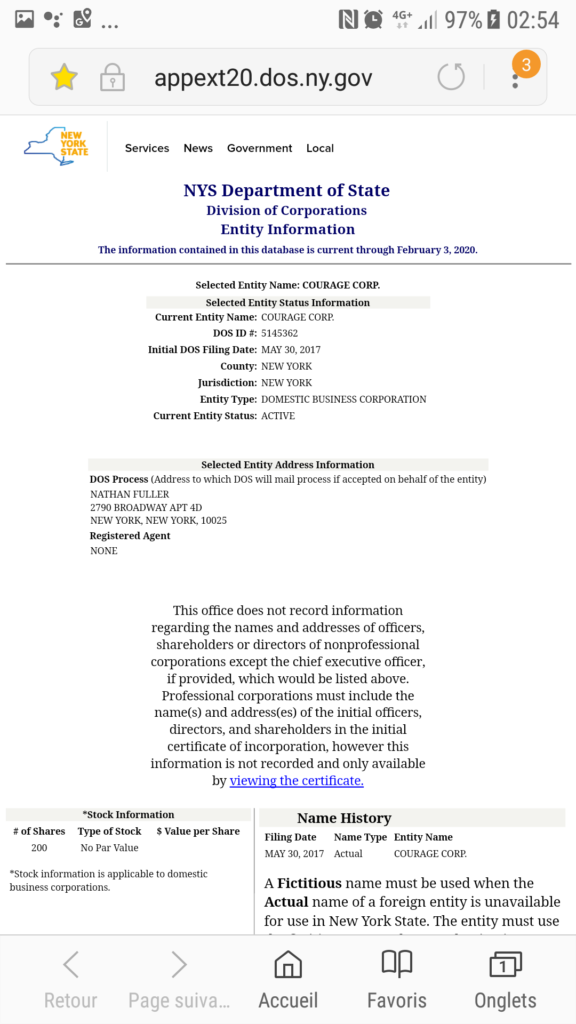
[11] https://serviceportal.hamburg.de/HamburgGateway/FVP/FV/Justiz/Stiftungsdatenbank/?sid=55#
Conclusion
When I saw Julian Assange for real on October 21, 2019, January 13, 2020, February 24, 25, 26 and 27, 2020 and September 9, 2020 what always struck me was the expression of sadness on his face, that of a man deeply wounded to have been betrayed by those he considered close. The men of the Wau Holland Stiftung were his ones were among his closest ones. They live quietly in Berlin and Hamburg between their private homes, their businesses (Andy Müller Maguhn’s Datareisenbureau), the Chaos Computer Club at 11 Marienstrasse where they meet, and the Wau Holland offices at 25 Marienstrasse in Berlin. They are free and nobody worries them. What’s worse, citizens’ money continues to flow quietly into Wau Holland’s accounts. Meanwhile, Julian Assange is dying and they appear to be indifferent to his fate. They have never even appeared at a single hearing of the ‘trial’. We consider their behaviour towards Julian Assange to be a moral and political fault. Morover, in regard of their responsabilities and actions described in this document on the grounds of official published reports, a citizen and judicial enquiry is required. Considering their responsability which interfere with Julian Assange extradition prosecution, they have to be taken into account in Court before any judiciary decision concerning Julian Assange.